




I am delighted that you are considering Nescot for your next steps. Every year around 2,000 16–18-year-olds join us to study on our range of career-focussed vocational courses. All our courses have a strong practical element, with an emphasis on ensuring you are ready for work or university. Teaching teams include practitioners from relevant sectors, and most learners complete work experience or an industry placement.
Nescot is a wonderful college on a green and wellconnected campus. I am very proud that Ofsted designated Nescot as a ‘Good’ college in January 2023. The inspection reflected our aim – that if you choose Nescot, you will benefit from being part of a college that supports and motivates its students towards success.
I would love to see you at one of our forthcoming open events. These are the ideal way to get a feel of our campus, explore our excellent facilities, meet tutors and current students.
On these pages you will discover what makes Nescot such a special college, from our varied courses, the skills they equip you with and careers they prepare you for, to our range of services and out-of-class activities provided by our dedicated support staff to ensure you get the most from your course and the college.
Our students are our top priority and you can be assured that from your first step, our team will ensure you have the best advice and guidance when you apply, the best possible education and training while you are here, and leave with the qualifications and skills to achieve your ambitions.
Julie Kapsalis CEO and Principal


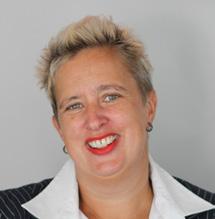

We’re a GOOD COLLEGE in every area, Ofsted 2023.
SPECIALIST AND WELL-EQUIPPED LEARNING SPACES, including dedicated construction workshops, on-site farm, hair and beauty salons, science labs, creative media studios, training kitchens and restaurant.
IMMERSIVE LEARNING ZONE, cutting-edge virtual reality learning zone with a variety of artificial intelligence tools.
SUSSEX AND SURREY INSTITUTE OF TECHNOLOGY, providing state-of-the-art training and apprenticeships in digital technologies.

EXCELLENT FACILITIES, including learning resource centre, Starbucks café, large refectory, indoor and outdoor sports facilities, gym, and theatre.
STUDENT SUPPORT, access to dedicated support from our careers, finance, learning and wellbeing team.
WELCOMING AND FRIENDLY, be part of a supportive, vibrant, diverse and inclusive community and take part in a range of activities and clubs.
EASY TO GET TO, located next to Ewell East station, large free car park and secure bicycle storage.



“As soon as you walk up to Nescot you’re met by a friendly team, who greet you with a smile and are happy to help with any questions.”







When studying at Nescot you’ll have access to a range of excellent facilities. You will find specialist and well-equipped learning spaces for every subject, including dedicated construction workshops, on-site farm, hair and beauty salons, science labs, creative media studios, training kitchens and restaurant, theatres, networking rooms and even a sensory room.
Our new immersive learning zone, features a variety of virtual reality and artificial intelligence tools for use across a wide range of courses on offer at Nescot. The cutting-edge technology includes vehicle simulators and a 360-degree projection system offering students an innovative learning experience.
Nescot is proud to be a centre of the new Sussex and Surrey Institute of Technology (IoT). Opened in a newly-refurbished centre in February 2024, the IoT at Nescot specialises in digital technologies with courses and apprenticeship programmes including software development, cyber security, data handling, and IT support.
The Learning Resources Centre (LRC) is a bright, open and welcoming environment, offering a wide range of printed books and journals, DVDs, e-books, e-journals and other online resources including video streaming. There are more than a 100 PCs including laptops available, with access to printers and photocopiers.

YOU’LL HAVE ACCESS TO OUR:
• Hair and beauty salons (professional and training) *
• On-site gym, sports hall, grass pitches and playing areas *
• On-site Osteopathy and Sports Therapy clinics *
• Our Starbucks café and Refectory *
• On-site nursery Nestots, rated Good by Ofsted in 2023 *
• Copying and printing services *
• Multi-faith room
• Large free car park and bicycle storage
• Football academy in association with Johnson Football Schools *
• E-Learning – Access to a range of online resources and courses.
*Charges apply, student discount available for certain services.



During your first few weeks as a student at Nescot, you and you challenging but achievable targets tailored to your career aspirations. We’ll monitor these targets carefully, and share your progress with your parents or carers. You will be expected to work hard and push yourself, but we have lots of specialist staff who can support you if needed.
While we do our best to ensure every learner is enrolled on the right course to meet their needs and goals, we know that for many reasons life can sometimes become complicated and difficult.
As a student at Nescot, you will have access to wideranging expert support. All these services are available to you free of charge and are easily accessed on campus through your tutor. If you have any questions, call the Admissions team
on 020 8394 3038 or email adviceteam@nescot.ac.uk, and they’ll be happy to help.
Students can access the following specialist teams:
Learning support, who assist students with additional learning needs. Student finance, who can give information about financial support such as grants and bursaries. Admissions, who can help with course information and application processes.
Careers advisor who can help with impartial careers advice.
College nurse.
Safeguarding and wellbeing team, who offer a range of support in order to help you achieve your full personal and academic potential. The team includes: Designated Safeguarding Leads, Wellbeing Mentors and Mental Health First Aiders. Student Experience Team who offer support and enrichment clubs.
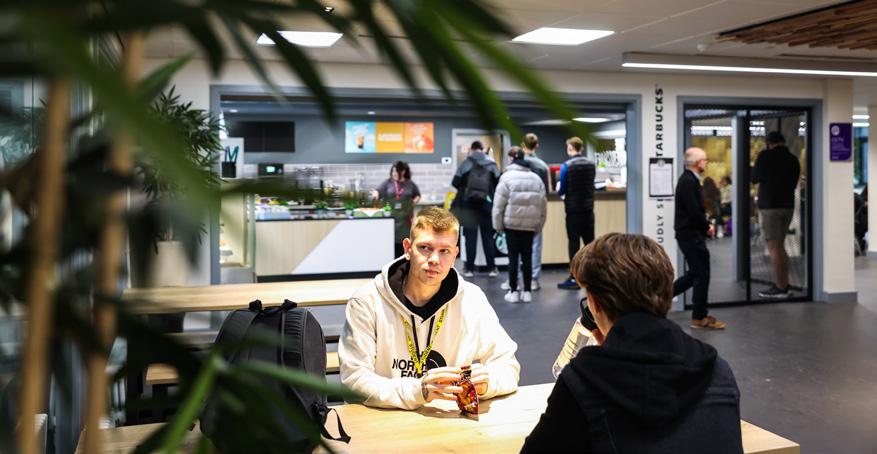


At Nescot, we focus on getting you ready for your career, not just getting you through your exams. You can expect specialist knowledge from your subject team, as well as advice on applying for jobs, university or apprenticeships.
We work closely with employers on designing our courses and facilities, so that you can be sure you leave Nescot ready for your next step. We design assignments and projects on what you’d be doing at work, and you’ll be taught by industry experts, who have already worked in the industry you’re aiming for, and they’ll be happy to help you learn from their experience.
Our tutorial programme focuses on what you need for your next step. This includes workshops on getting your CV ready, preparing for interviews, help with work skills like time management and teamwork, and assistance applying to university. As a part of the Sussex and Surrey Institute of Technology (IoT), Nescot is developing links with employers across the region, extending opportunities for progression in new technologies.
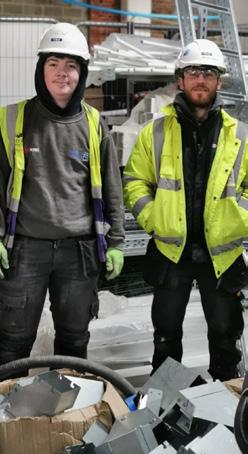
Work experience is a great opportunity for you to put your learning into practice while gaining knowledge about a job or area of work. Work placements can support you with deciding your future career choices or study options and might lead to an apprenticeship or fulltime work. Work experience
can also help demonstrate how you developed your employability and vocational skills on your CV, helping you to stand out from the crowd. A placement can be as little as one week (short work experience) or up to about 45 days (industry placements) depending on the course you are studying.
You will be given more information about the dates and hours required for your course during your first weeks of study.
For more detailed information visit our website www.nescot.ac.uk




We also work with the National Careers Service for adults, which gives advice on careers, skills and the labour market. You can book an appointment by calling NCS directly on 0800 100 900
Nescot will support you to become career-ready. We have a wealth of information and resources to help you research and plan your future career. We understand that planning your career can be daunting. We have lots of different ways of helping you to work out which career would suit you best, and how to get the qualifications and experience you need.
Whether you’re thinking about full-time courses, apprenticeships or university-

We have a careers advisor who can give you impartial advice on your options.
For a free one-to-one session, just call 020 8394 3138. ap
We are introducing the online careers and work experience platform ‘Grofar’, to help students and parents/carers understand the options available.

Each full-time student will have their own study programme designed. We’ll start with your full-time course, and we’ll talk to you about what you’ve already achieved and what we think will help you progress towards your future career.
If you don’t already have a grade 4 (grade C) or above at GCSE English and Maths then these subjects or Functional Skills will be added to your study programme. Your study programme may also include a work experience placement, an extended project, and workshops to help you search and apply for jobs.
Study programmes include at least 540 hours spread across the academic year.
All parts of it are compulsory.

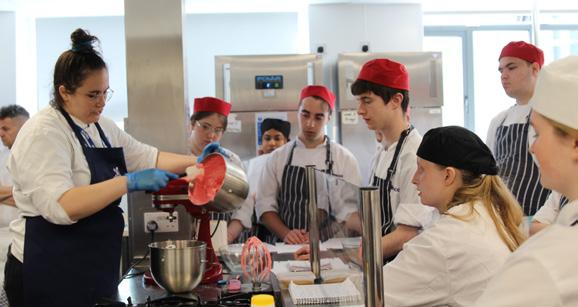

The pages in this prospectus will give you an overview of the courses we offer. You can find out more online, but if you have any questions you’re very welcome to call our friendly Admissions team for a chat on 020 8394 3038.
The team are Matrixaccredited, which means they give expert and impartial information on your career. They will also be happy to answer any questions you have about choosing the appropriate course level, and whether to study full-time or seek an apprenticeship.
Entry Requirements
Higher Apprenticeship 4+ LEVEL 3 LEVEL 2
80 UCAS points, for example (Merit, Pass, Pass).
Aged 18+.
OPTIONS
Higher Education at University or Nescot
Entry Requirements
16-19 years old: 4 GCSEs at Grades 4-5, including one in Maths and English, or Merit at Level 2 Diploma or equivalent. Some courses may require different grades.
OPTIONS
Further Education T-Levels
Employment with training Apprenticeship
Entry Requirements
4 GCSEs at Grade 3 or above, although some courses may require different grades according to the course area. For more details see course pages. We will ensure you understand entry qualifications for the course you wish to join at interview and enrolment stages.
OPTIONS
Further Education Apprenticeship
Employment with training
Entry Requirements
Construction: 2 GCSEs at Grade 3 or above (incl. Maths & English). Beauty, Hair and Catering: 3 GCSEs at Grade 3 or above and Initial Assessment (at interview)
Other subjects: 2 GCSEs at Grade 2 or above, or similar.
OPTIONS Further Education
Entry Requirements
• An advisory interview and an assessment
OPTIONS Foundation Learning courses




T-Levels are an exciting qualification option for school leavers. Nescot is proud to be offering T-Level qualifications in our specialist areas including Animal Management, Health, Childcare, and Digital.


T-Levels are two-year courses for school leavers, at Level 3 (A-Level equivalent). T-Levels combine classroom learning and hands on experience with about 45 days of work placement, with a focus on practical and technical skill development to prepare students for a career in their chosen sector.
T-Level courses include:
A technical qualification with core theory, concepts and skills.
Specialist skills and knowledge for a career in the relevant industry/sector.
A substantial work placement in the industry with an employer.
At the end of the two-year course, students will receive an overall grade (Pass, Merit, Distinction, Distinction*). The T-Level also carries a grade for the core component and occupational specialism.
Did you know the T-Level has the potential for you to earn UCAS points equivalent to taking three A-Levels?

Animal Management
Childcare & Education
Digital Design
Production and Development
Digital Support Services
Health
Entry Requirements: English and Maths at GCSE Grade 4 or above are required. You will need a Grade 4 or above in three other subjects, relevant to your course choice. Applicants will have an interview at which they will show a strong interest and commitment to study in the sector.
After completing a T-Level your options may include:
Skilled employment as you will have gained in-depth skills from the technical work in the T-Level.
Higher-level training or apprenticeships with the new Sussex and Surrey Institute of Technology
Higher-level technical study including university





Nescot is proud to be a centre for the Sussex and Surrey Institute of Technology (IoT), which is enhancing higher-level skills training across the region. Together with partner colleges, universities and employers, we are leaders in the provision of high quality, higher-level technical education and training across a range of STEM occupations and industries.
At Nescot, the IoT hosts a state-of-the-art computing zone, including labs for robotics, cyber security and artificial intelligence. Students will benefit from enhanced progression opportunities and links to employers in many sectors.
The IoT provides progression opportunities into apprenticeships and higher level study in:
Engineering & Manufacturing Technologies
Digital Technologies
Construction, Planning &
The Built Environment
Sustainable Technologies & Practices
To find out more see www.sussexsurreyiot.ac.uk





In the Animal Studies department we recognise that the transition to college can be exciting but daunting. We pride ourselves on providing our students with a warm, supportive but challenging environment in which anything is possible. We use a wide range of teaching and learning methods because we know that students are as diverse as the animal kingdom!

“So far this year we’ve learnt about British wildlife, biology, and legislation”

Large animal care unit set in 12 acres of pleasant and attractive grounds, accommodating numerous species.
Our lecturers are highly experienced in teaching, assessing and animal management.
Evolving curriculum to meet the changing requirements of the animal industry.
Our course provision spans from Level 1 through to Level 6.
All students complete a work placement with an animal organisation such as Deen City Farm, London Zoo or Heathrow Animal Reception Centre.
While the courses are both physically and mentally challenging, this is a friendly, welcoming place to learn and you will find yourself growing in maturity and confidence throughout your time here.
The courses we teach attract people with many different career aims, from potential veterinary nurses and zoo keepers to stock managers and conservationists.

“There is a wide range of animals on the unit, which means we get amazing opportunities as students. The teachers all have different backgrounds, so we can learn different things from all of them. We’ve been talking about sustainability in our lessons, and we’re helping the staff to make small changes on the unit to make it even more sustainable.”
Entry Requirements:
GCSE English and Maths at grade 2, or Functional Skills English and Maths at Entry Level 3.
Progression Diploma
Entry Requirements: Entry is by discussion with the course team. See website for more details.
Entry Requirements:
GCSE 3/4 grade profile in Maths and English as well as GCSE Science grade 3.
Day-to-day animal care
Understanding animal behaviour
Customer service
Team working
Professional standards in animal care
Flexibility and working in a ‘round-the-clock’ industry
Organisational skills
Administration skills
Work stamina and productivity
Budget awareness and management

Advanced Technical Extended Diploma in Animal Management
Entry Requirements: 4 GCSEs at grade 4 or above including Science, English and Maths.
Animal Management
T-Level
Entry Requirements: 4 GCSEs at grade 4 or above including Science, English and Maths. Your results will decide which Level 3 you are best suited to
Progression at Nescot
Foundation Degree in Animal Welfare & Management BSc (Hons) Animal Management and Current Conservation (Top-Up)




Catteries
Our students have gone on to universities including:
Aberystwyth (Herpetology), Surrey (Veterinary Biosciences and Veterinary Medicine), Roehampton (Zoology) and Lincoln (Animal Behaviour), Nescot (Level 5) Or directly into employment in:
Veterinary surgeries, zoo conservation projects, animal behavioural training and many other areas
Some students have set up their own businesses, such as:
Dog walking, dog grooming and birds of prey education
City farms
Conservation
Dog groomer
Kennels
Pet shops
Quarantine work
Rescue centres
Stables
Teaching
Uniformed services
Veterinary nurse
Zoos

“I finished my Level 3 qualification with a triple distinction-star profile, which I was really proud of, and then I progressed to the Foundation Degree. We get a lot of practical experience on the Animal Care Unit, and you get more responsibility as your knowledge and experience increases. One of the most interesting experiences was helping out with lambing. We stayed overnight to help, including weighing the lambs and supporting the ewes.”







The Art and Digital Design department at Nescot offers an interdisciplinary programme which concludes in a specialism as students develop and expand their knowledge and skill set.

“We’re encouraged to research thoroughly and work as a team. It has been good preparation for university”

A focus on skills development across the different academic levels.
Students will curate and present their work in public exhibitions each term and develop a professional portfolio as a key aspect of their creative development.
Our students develop into autonomous young practitioners through the completion of a range of engaging and relevant projects such as fine art, fashion and textiles, digital design, illustration, printmaking and concept art.
Establishing and evolving links to industry, ensuring impact is felt at student level.
Knowledgeable and enthusiastic staff embed their industry-experience across a range of programmes.
Enriching the curriculum through unique educational experiences:
Exploring some of the most inspiring galleries in London. International and domestic trips inform student projects. Well informed guest speakers from a variety of specialists who celebrate the diverse nature of the creative industries.
Creating a learning environment that is safe and inclusive, allowing Art and Digital Design students to be both reflective and ambitious.
An array of industry-standard facilities that empower learner productions such as our large studios and media labs.
Expert staff support students’ journey to their chosen progression destination.

“My course has helped me pin down exactly what I want to do and given me the foundation and basis for what I plan to do next. My tutors have been very supportive and their guidance has helped me. My advice to anyone thinking of doing this course is to embrace every opportunity.”
Entry Requirements:
4 GCSEs at Grade 2 or above. No Art & Design GCSE necessary.
Entry Requirements:
4 GCSEs at Grade 3 or above.
Entry Requirements:
4 GCSEs at Grade 4 or above - including English, Art & Design or an Art related subject.
Idea conception
Understanding your audience
Constructive criticism
Collaboration
Portfolio development
Passion and selfmotivation
Digital and technical skills
Flexibility and working to deadlines







Our students have gone on to universities including:
Oxford University, London College of Fashion, UAL - Chelsea College of Arts, UAL - Camberwell College of Arts, UAL - Wimbledon College of Arts, London College of Communication, University of Brighton, University for the Creative Arts and Central Saint Martins.
3D modeller
Advertising and marketing communications
Animator
Architect
Ceramic artist
Concept artist
Costume designer
Fashion designer
Fine artist
Graphic designer
Illustrator
Interior designer
Model maker
Product designer
Prop maker
UX/UI designer
Visual merchandiser

“I completed both my Level 2 and Level 3 courses at Nescot. My time at the college has helped me with my planning, problemsolving skills and with my next steps at university. My tutors have been amazing and deserve gold stars all round!”




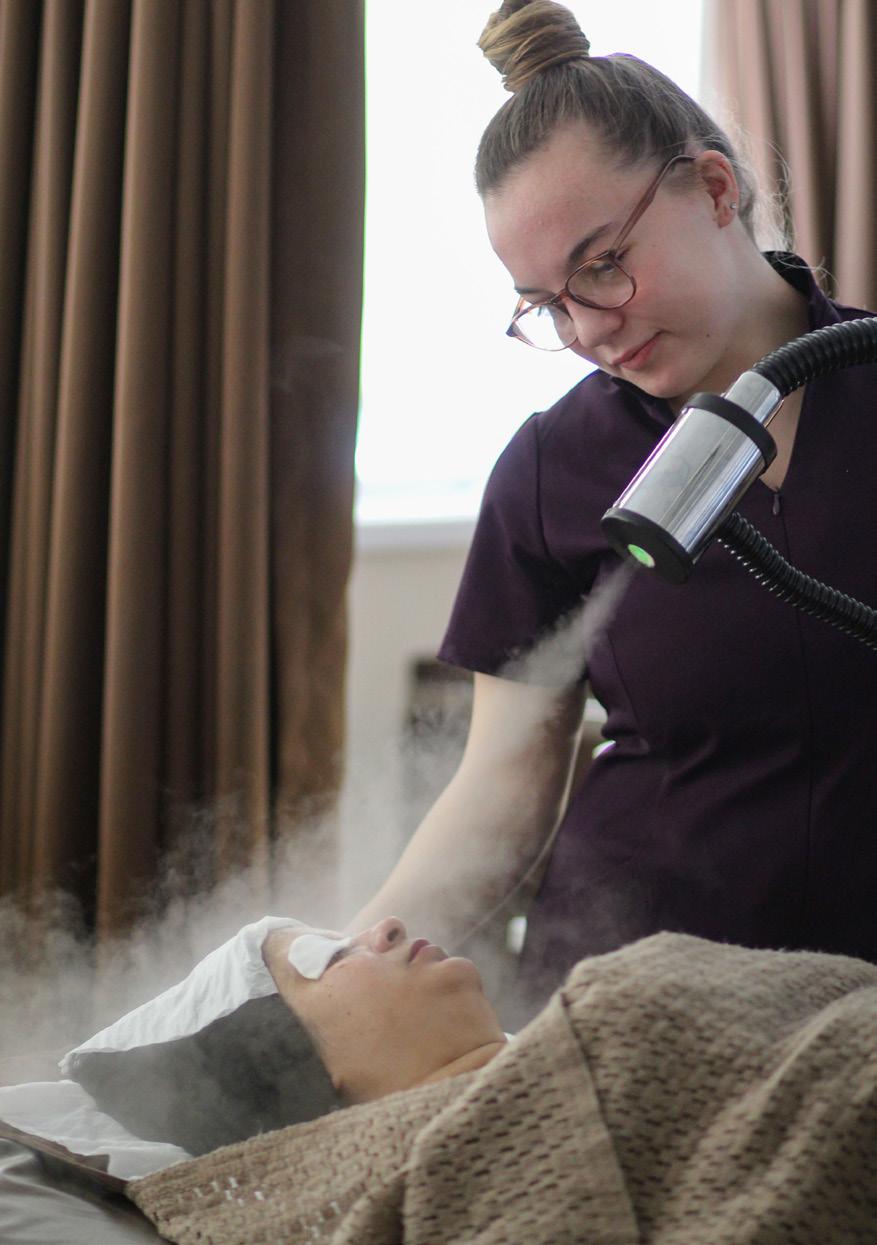


This course provides a solid foundation for those interested in a career in Beauty Therapy. By completing the program, you’ll acquire essential skills and techniques that will prepare you for advancement onto further courses. Our beauty therapy lecturers are experienced therapists and teachers with extensive training within the industry. Our students develop the highest standards enabling them to stand out from other applicants when applying for jobs.

“The equipment and products we have access to are amazing”

Three training academy salons, equipped with 20 couches in each.
The opportunity to gain additional qualifications such as spray tanning, eyelash extensions and Gel nail techniques.
Train with high-end products such as OPI and Eve Taylor face and body aromatherapy skincare.
Practical and theoretical learning environments.


“The best thing about the course is definitely the teachers, and I really feel that they’re preparing us for working in the industry. There’s a strong focus on health and safety and customer service, as well as a lot of attention to detail, and I think that’s what employers are looking for.”
Entry Requirements:
A minimum of 3 GCSEs at grade 4, including English, and 1 GCSE at grade 3 or above.
Entry Requirements:
Level 2 in Beauty (either technical or merits at VRQ or equivalent) plus GCSE English.
Anatomy & physiology
Customer service / Client Care
Communication skills
Digital skills
Industry acceptable time frames
Keeping to time
Portfolio development
Self-management
Numeracy
Health & safety

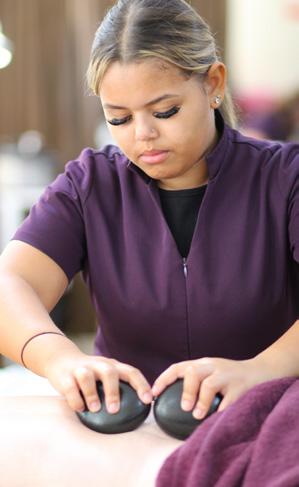



Our students have gone on to employment: with many local salons and spas, cruise liner spas, and overseas resorts or self-employment.
Some students have set up their own businesses, such as:
Beauty Be Mine (Worcester Park) - established by a former Nescot student who has opened her own business and gone on to hire Nescot students.
Beauty therapist
Brand trainer
Cosmetics retail
Cruise ship spas
Facial treatment specialist
Hair and beauty sales
Image consultant
Make-up artist
Lash technician
Massage therapist
Nail technician
Receptionist
Salon manager
Semi-permanent makeup
Spa manager
Television, film and theatre

“I’ve always been interested in beauty therapy, and when I visited Nescot for an open evening the facilities were much better than any others I had seen. This year we’ve been doing treatments like manicures, pedicures, facials and waxing, and next year we move on to the electrical treatments. We get to have lots of practice on real clients, and that feedback helps you to improve. I’d like to have my own salon one day.”






Many of our past students have come up through the ranks to become site supervisors, run their own businesses or lead big housing projects.

“People always need bricklayers, and it is a really good foundation for other trades”


Bricklaying isn’t all just about bricks and mortar. Before you begin building something you’ll need to know the best way to go about it. At Nescot we develop your ability to analyse, problem solve and make the correct decisions to get the job done right first time.
Learn in a large wellequipped workshop.


“I enjoy doing brickwork, it’s all about crafting, being creative, working as a team and having fun too. My Level 1 course has taught me all about the basics of brickwork. I plan to move to Level 2 and specialise in a career path in the trades as my next steps. Nescot is one my favourite places, I feel happy and safe here. It has helped boost my confidence and self-esteem. If you’re in Year 11 or Sixth Form and considering a career in the construction industry, I would recommend checking out the courses here.”
Brickwork Construction Skills Diploma
Entry Requirements: 2 GCSEs at grade 2 in English and Maths.
Bricklaying Diploma
Entry Requirements: 2 GCSEs - grade 2 in Maths and grade 3 in English.
Bricklaying Diploma
Entry Requirements: Level 1 Diploma in Brickwork plus English and Maths.
Health and safety
Communication and teamworking
Construction terminology
Organisational skills and planning
Numeracy and literacy
Sustainability
Professionalism and self-development
Problem solving




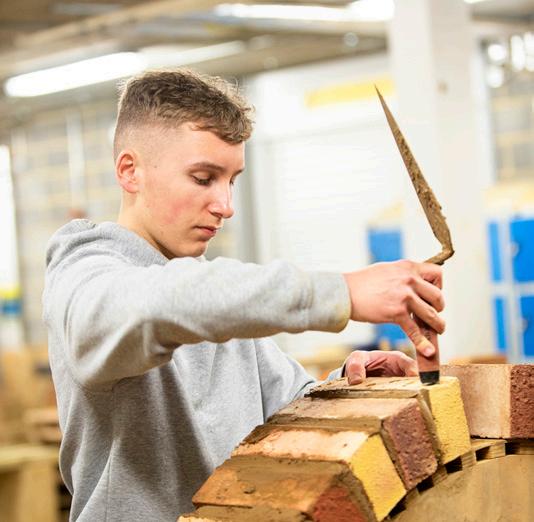
Bricklayer
Builder
Building supplies
Project
Co-ordinator
Start your own business
Site manager
Site supervisor
Stonemason
Work for a small or large construction business

“I chose Nescot because the facilities were so much better than anywhere else, and everyone I spoke to said it was the best college. I’m planning on doing my Level 2 here next year and then working on-site, and eventually I’d like to be a site manager.”


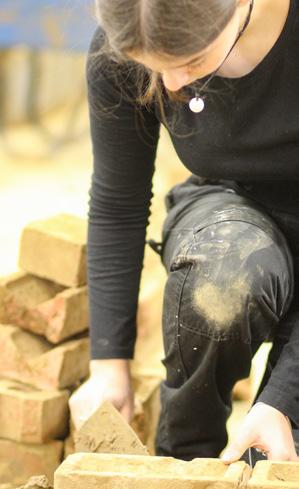

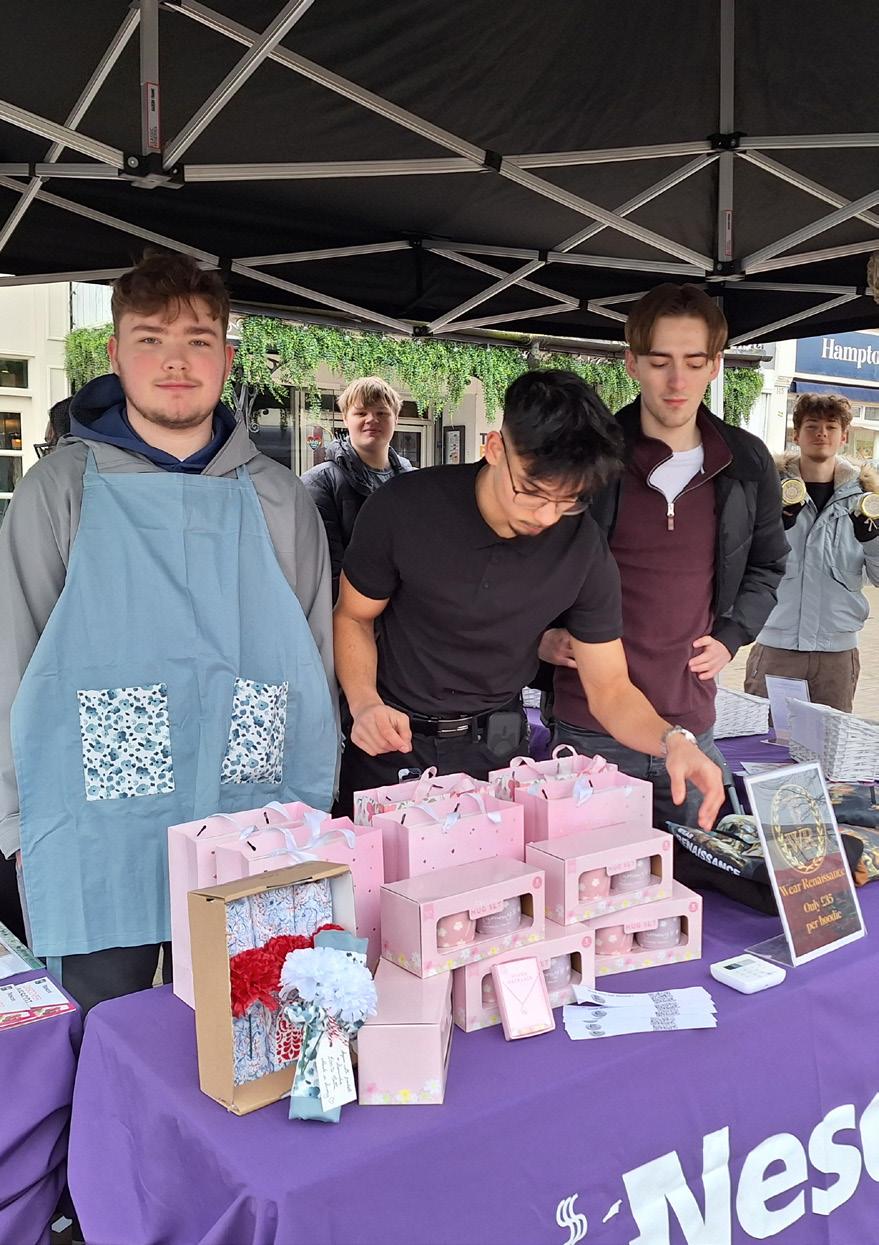

We are committed to teaching you more than just the theory of business. Our teachers will help prepare you for a successful career.

“I’ve learnt a lot from the course, and it’s really improved my confidence”


Students have competed in the Tycoon Enterprise Competition run by the Peter Jones Foundation where they set up their own businesses. This included raising funds, designing and commissioning products, then sold these to the local community for a profit they share at the end of the academic year, when they liquidated their company.
You will not only learn the rules and skills you need for the business world, but will be given the tools to progress from a student into a business professional.
We regularly have guest speakers in to talk to students about their experiences in the business world.
Every one of our students will research, target, apply for, and spend at least a week doing meaningful work experience in an area they find exciting and relevant.
We treat our students as adults and encourage them to take responsibility and pride in their assignments, behaviour, professional conduct and appearance.
You will also take part in organising events for some of your units. You will learn to plan and pitch for business ‘Dragon’s Den’ style.
UK trips to look at reallife examples of business functions like sales and marketing.

“The best project we’ve done was the enterprise competition. We had to set up a real business and run it, and make the most profit possible. It was at the end of our course, so we could take everything that we’d learnt and put it into practice in a real business. We had to do everything ourselves, from thinking of an idea to sourcing products and setting a pricing strategy and then running the company as a team.”
Business & Information Technology
Entry Requirements: 4 GCSE at Grade 2, including English and Maths.
Business Enterprise
Technical Certificate
Entry Requirements: 4 GCSEs at grade 3 or above in Maths and English.
Enterprise & Entrepreneurship
Extended Diploma
Entry Requirements: 4 GCSEs at grade 4 and above, including Maths and English.
Entrepreneurship
Decision making
Business finance
Networking
Management
Operating safely and legally
Human resources
Marketing
IT and data for business
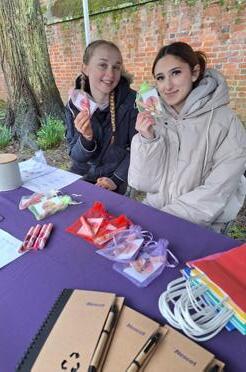




Our students have gone on to higher education to study:
AAT Accounting, Business Studies, Real Estate, Business Management, Finance and Business Law
Or into apprenticeships and employment including:
KPMG, Unilever (Marketing), Estate Agency, Retail Management, Office Team (Admin/Marketing), Estate Agency Sacha Scott (Sales) and Wilsons Cars (Sales)
Accountancy
“Peter Jones really liked the business idea, he told us to keep going and even bought some of our car fresheners. It was a great experience attending the event, we received valuable advice and guidance for our product and marketing material”

One of our student-led business teams, Just Fresh, was selected to showcase their product and branding at the Peter Jones Charity Golf fundraiser at Foxhills Country Golf Club in Surrey.
Level 3 Enterprise and Entrepreneurship students, Chloe, Sacha, Paul, Em and Cebrina were part of the Tycoon Enterprise competition run by the Peter Jones Foundation. Their business idea, Just Fresh, offered a unique approach to car air fresheners.





Most construction projects need carpenters, so the job can take you anywhere from homes and commercial properties to building sites. Skilled carpentry is crucial to new builds, restoring and recreating historical buildings and providing timber elements of complex concrete supports.

“The facilities at Nescot are great – we have everything we could ask for”


At Nescot, you will learn from tutors with specialisms ranging from restoration work with organisations like the National Trust to working with architects on cuttingedge new builds. You will learn from experts in joinery, shuttering and moulding, and site supervisors on
large refurbishments and new estates.
The UK construction industry will need around 260,000 wood trades and interior fit-out occupations by 2023 (Construction Skills Network research - LMI).


“You get a lot more responsibility at Nescot, and I like that. It’s not like school – there’s a mutual respect, and you’re treated like an adult. The teachers are always there when you have questions or you don’t understand something, and they push everyone to the best of their ability.”
Carpentry & Joinery Diploma
Entry Requirements: 2 GCSEs at grade 3 in English and Maths.
Entry Requirements: Level 1 Diploma in Carpentry and Joinery plus English and Maths.
Level 2 Carpentry & Joinery Apprenticeship
See page 106 for more information
Health and safety
Communication and teamworking
Construction terminology
Organisational skills and planning
Numeracy and literacy
Sustainability
Professionalism and self-development
Problem solving

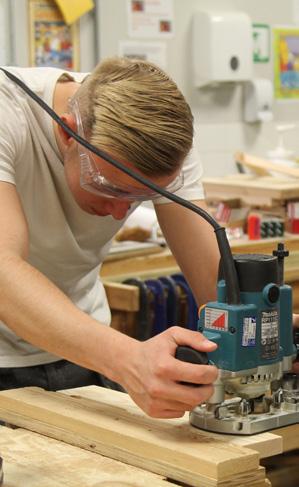
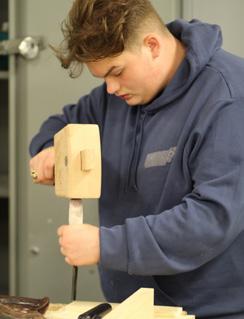



Kieran won first place in the regional qualifier for SkillBuild 2024 for Carpentry, Furniture and Cabinet Making.
Kieran has completed his Level 2 Diploma in Carpentry. The SkillBuild Carpentry competition is designed to reflect the role of a carpenter and the standards that are expected within the construction industry.
Cabinet making
Finishing carpentry
Joinery shop
Maintenance
carpentry
Roofing
Site carpentry
Timber yard worker
Work for a small or large construction business

“I was planning to do A-Levels, but I wanted to learn something new. I had never picked up a power tool before, so this year has been a steep learning curve, but the teachers are really good. We learnt about different joins at first, and then we worked on bigger projects, like a roof. I definitely want to stay at Nescot, so I’ll do my Level 2 next year.”







If you have a passion for cookery and excellent customer service, Hospitality and Catering could be the career for you. We have state-of-the-art training kitchens and an on-site training restaurant, ‘Food For Thought’. Our students get to prepare food for a number of major events each year, such as award ceremonies and VIP receptions. The industry offers a variety of job opportunities and career pathways.
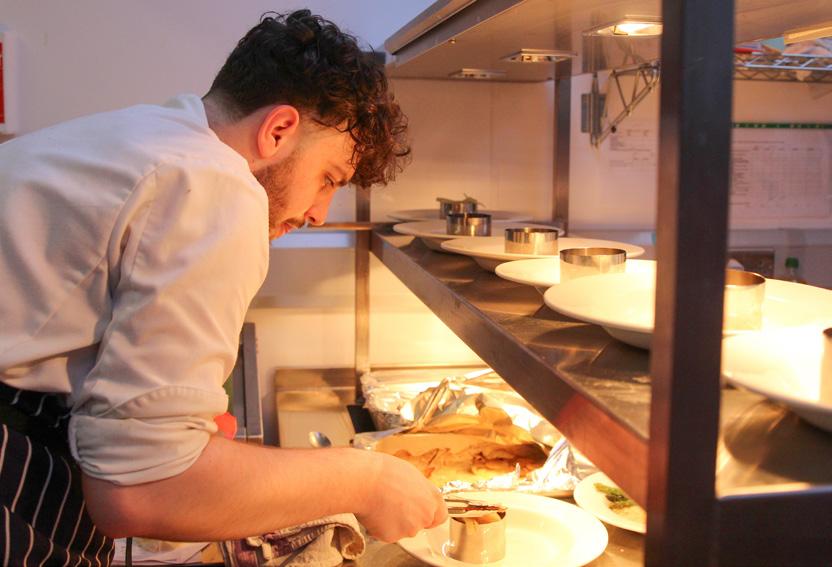
“The teachers have very high standards, as would be expected in professional kitchens”

Develop your skills in professional cookery in our modern training kitchens and also have the opportunity to gain experience in a realistic working environment.
Level 1 focuses on cooking methods. Level 2 centres on food commodities, preparation and cookery and Level 3 covers advanced level skills and gastronomy.
Learn to prepare and cook a variety of different foods, using different methods including boiling, poaching, steaming, roasting, baking, grilling and frying.
External visitors and speakers providing demos including The Ritz, Royal Navy, The Marriott Hotel Group, local butchers and fishmongers, and the RAC Club.
Work with fresh produce and a range of ingredients.
Trips which can include Borough Market, Food Expos and industry establishments, which can include Taste of London, Cake & Bake Show and Wine Pairing.

“We’re given a brief, and then we plan our time carefully and have all our dishes ready at the right time and to the right standard. It can be quite hard, but it’s exactly what we’ll be doing as chefs, so it’s good practice. The teachers give us time to practice the dishes in advance, and they give us feedback so that we can improve.”
Initial Skills for the Catering Industry
Entry Requirements: Entry Level 3 or above in both Maths and English.
Introduction to Professional Cookery Diploma
Entry Requirements: 4 GCSEs at grade 3 or above including English and Maths
Professional Cookery Diploma
Entry Requirements: Level 1 Professional Cookery, or at least 12 months working in the catering industry.
Customer service
Communication skills
Teamwork
Problem solving
Professionalism
Time Management
Multi-tasking
Attention to detail
Catering operations
Cost and menu planning
Health and food
Safety awareness


Advanced Professional Cookery Diploma
Entry Requirements: Level 2 Professional Cookery or equivalent.
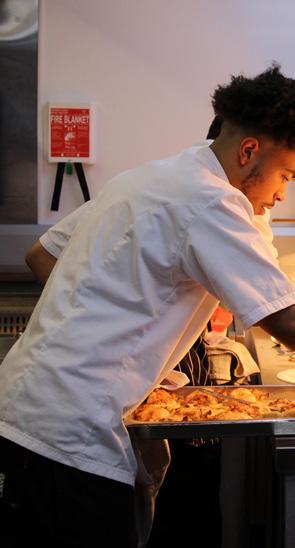


Our students have gone on to jobs including The RAC Club - Pall Mall, Epsom College and The Ritz
Artisan baker
Bar tender
Barista
Butcher
Butler
Cake decorator
Catering manager
Chef
Chef de partie
Commis chef
Development chef
Events manager
Food & beverage manager
Food stylist
Food writer
Head chef
Housekeeper
Kitchen assistant
Kitchen porter
Mobile catering
Publican/licensee
Restaurant manager
Sous chef
Waiting staff

Catering and Hospitality students Iustin and Melissa secured their places at the prestigious WorldSkills UK National Finals, which will take place in Greater Manchester in November 2024. They will be competing in the Culinary Arts category, having progressed through college tests and regional heats. Keep an eye on our website and socials to find out how they did.







Tutors have excellent experience within the industry and have forged strong links with national and local IT companies. Nescot’s computing department is highly successful in skills competitions and our students compete regularly in WorldSkills UK and other industry competitions. Nescot is proud to be a centre for the Sussex and Surrey Institute of Technology.

“There are so many different potential career routes and you get to explore them all”

On each course you will study a range of units covering hardware and software, with an emphasis on the practical skills you need to succeed in industry.
You’ll be taught by people with experience in the industry. Our tutors have worked in Network Administration and Security, Project Management, Web Applications Development, Software Development and Database Programming. We have close links and academy status with the leading organisations in Big Data, Cloud Solutions and Cyber security. The Department also has a 20year relationship with Cisco and was one of the first
institutions to be granted Cisco Academy status.
We run Cyber Security workshops in partnership with the NCC Group, Comptia, Sophos and BAE Systems, where students take part in the Cyber Security Challenge UK and have talks and practical demonstrations from industry experts.
Our students get work experience and training with organisations including BAE Systems, Cisco, IBM and Bidatask.
You can expect to be able to shine at competitions like WorldSkills UK.

“We do a lot of projects that are based on what we will do in the future. I like real-world projects, because you can see what you’re doing and why, and it helps you to build on your strengths. Sometimes we work in groups, which is also good practice for work. For example, one project was to design a website for a community group.”
Business & Information Technology
Entry Requirements:
4 GCSEs at Grade 2, including English and Maths
Certificate in Information and Creative Technology
Entry Requirements: 4 GCSEs at grade 3 or above including English and Maths.
Digital Design Production and Development – T level
Entry Requirements:
5 GCSEs at grade 4 or above including Maths and English.
Digital Support T-Level
Software development
IT Networking
Hardware installation and maintenance
Literacy and numeracy
Motivation and self-development
Interview skills
Communication
Professional standards

Entry Requirements:
5 GCSEs at grade 4 or above including Maths and English.
Level 3 Cyber Security
Level 3 Digital Support Technician
Level 3 Information Communication Technician
Level 3 Software Development Technician
See page 109 for more information
Progression at Nescot
Cyber Security Technologist Apprenticeship
Software Development Technician Apprenticeship
Diploma in Web Application Development




Our students have gone on to universities including: King’s College London, Birmingham City University, University of Portsmouth, University of Brighton, University of Cambridge, University of Hull, University of Roehampton, Kingston University London, University of Westminster, University of Bristol and Nescot (Higher Education).
Artificial intelligence data specialist
Audio visual technician
Cyber security technician
Cyber intrusion analyst
Data analyst
Digital support technician
Games developer
Infrastructure technician IT solutions technician IS business analyst
Network engineer
Programmer
Security expert
Software developer
Software tester
Systems analyst
Web designer

“The course this year has been really varied, from learning more about hardware to covering HTML and databases. It’s given me a lot more knowledge about the industry and the different career options I have, and I feel a lot more confident in myself.”







Our courses prepare our young people for progression into the Creative Industries by delivering an engaging and inspiring experience. We utilise our industry standard facilities such as, the ESports Hub, Podcast Suite, TV Studio, Screening room and seven media labs fitted with the Adobe Suite and game engines.

“The best thing about the course is the variety of projects we work on”

A focus on skills development across the different academic levels.
Our students develop into autonomous young practioners through the completion of a range of engaging and relevant projects.
Establishing and evolving links to industry, ensuring impact is felt at student level. Courses are designed to centre around the creation of student-led content.
Knowledgeable, enthusiastic and industryexperienced staff.
Creating a learning environment that is safe and inclusive, allowing Creative Media students to be both reflective and ambitious.
Enriching the curriculum through unique educational experiences:
- Showcasing student productions both locally and beyond
- Well informed guest speakers who celebrate the diverse nature of the creative industries
- A varied programme of domestic and international trips aimed at developing students both professionally and pastorally.
An array of industry-standard facilities that empower l earner productions.
Expert staff support students’ journey to their chosen progression destination.

Three Level 3 Extended
Diploma Creative Media (Film and Broadcasting) students were commissioned to film interviews conducted by Epsom and Ewell Times with the prospective UK Parliamentary candidates for the Epsom and Ewell constituency in June 2024. All three Creative Media students Jess, Frankie and Charlie said that it was an amazing experience and an interesting insight into filming political discussions
Intro to Creative Industries Diploma
Entry Requirements: GCSE English and Maths at grade 2, or Functional Skills English and Maths at Entry Level 3.
Creative Media Diploma
Entry Requirements: 4 GCSEs at grade 3 or above.
Creative Media (Film and Broadcasting) Extended Diploma
Entry Requirements: 4 GCSEs at grade 4 or above including English.
E-Sports and Digital Marketing Extended Diploma
Technical Knowledge
Working to a brief
Project management
Quality control
Multitasking, collaboration and teamwork
Networking and self-promotion
Freelancing
Problem solving and flexibility
Communication


Entry Requirements: 4 GCSEs at grade 4 or above.
Progression at Nescot
Foundation Diploma in Art and Digital Design (Lens Based Media)
Creative Enterprises Professional Diploma (Esports and Digital Marketing)



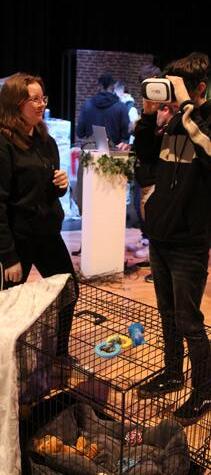
Our students have gone on to employment including:
ILM Producer - Aladdin, Sound Recordist - The Crown, Production Runner - The X Factor, Music
Videographer, and Framestore
Or students have gone on to universities including:
HND Moving Image - Nescot, TV Production and Cinematography - Bournemouth University, Journalism - UAL, Events
Management - University of Gloucestershire and Digital Film
Production - Ravensbourne
Animation
Broadcast
Cinematographer
Compositor
Events management
Designer
Film editor
Film or TV producer
Journalism/ publishing
Lighting engineer
Marketing / Advertising
Media producer
Product designer
Production runner
Radio
Sound engineer
Sound recordist
Videographer
Visual effects

A team of four students from Nescot’s creative media courses won a Gold medal at Worldskills UK in November 2023. They had spent the week in Manchester along with teams from around the UK, competing in digital media production. Two days of intense work shooting and editing their film was followed by a ceremony on Friday night, where the team were thrilled to be announced as the Gold medal winners, chosen by a panel of experts and employers from the industry.
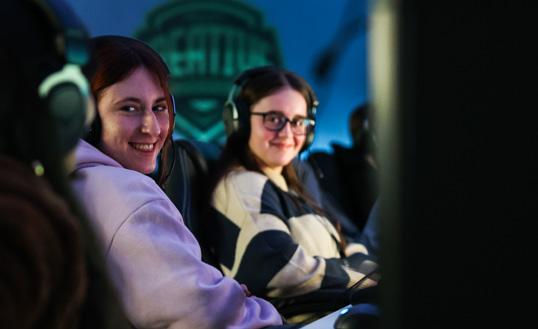


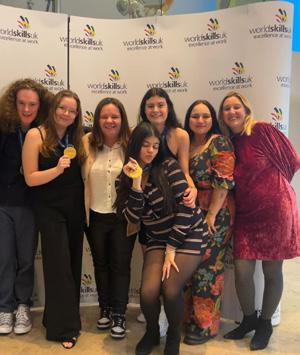



Early Years at Nescot provides students with a strong foundation for their journey as an early years practitioner. With a focus on innovative practice, all students use their skills in a work placement, which allows them to nurture links with employers and prepare for employment.

“We’ve learnt a lot about using Makaton and visual aids”

Targeted work experience in an organisation relevant to your area of study, so that you can see for yourself how your skills could fit in different sectors. We even run our own careers fair where you can meet employers.
Early years employers frequently send us their vacancies because they want someone who is ‘Nescot qualified’.
Tutors are excellent teachers and mentors with a wide breadth of industry experience, including nursery managers, special needs practitioners, primary school learning support and nannying.
The quality of teaching in the department has consistently been recognised as good or above.
Do work experience at a range of placements including our on-site nursery, Nestots.
T-Level students get additional qualifications in cooking and paediatric first aid, to increase their employability even further.
Students go on a range of trips throughout the year, including to Thorpe Park and Brighton, to give them an opportunity to practice planning an effective trip.

“I like how the course is structured, with lessons at college and the work placement. I did placements in two primary schools and a nursery, and I learnt a lot from it. When you have lessons and a placement then they both improve your learning. Doing work placements also helps you make a genuinely informed choice about your career, because you understand what the job is like day-to-day. ”
Introduction to Health, Social Care and Children and Young People’s Settings
Entry Requirements:
A minimum of grade 2 in GCSE Maths and English.
Entry Requirements:
4 GCSEs at grade 3 or above including English or Maths.
Resilience and mental health
Knowledge of Early Years Foundation Stage framework
Legislation and health & safety
Organisation and communication skills
Safeguarding and equality & diversity
Self-confidence
Empathy and care giving
Literacy, numeracy and IT skills
Observation and assessment
Education and Child Care – T level
Entry Requirements:
5 GCSEs - grade 5 in English, grade 4 in Maths and three other subjects.

Level 3 Early Years Educator
See page 106 for more information
Progression at Nescot
Foundation Degree in Early Years Pedagogy (0-8 years)
Coming Soon - Early Years Apprenticeship
BA (Hons) Professional Practice Working with Children and Young People (0-19) - Top Up




Our students have gone on to universities including:
St Mary’s University, University of Roehampton, University of Greenwich and Kingston University.

Childminder
Children’s nurse
Crèche assistant
Early years teacher
Holiday childcare representative
Hospital play specialist
Nanny Nursery assistant
Nursery manager
Playworker
Primary school teacher
Special care baby unit assistant
Special needs
teaching assistant
Teaching assistant
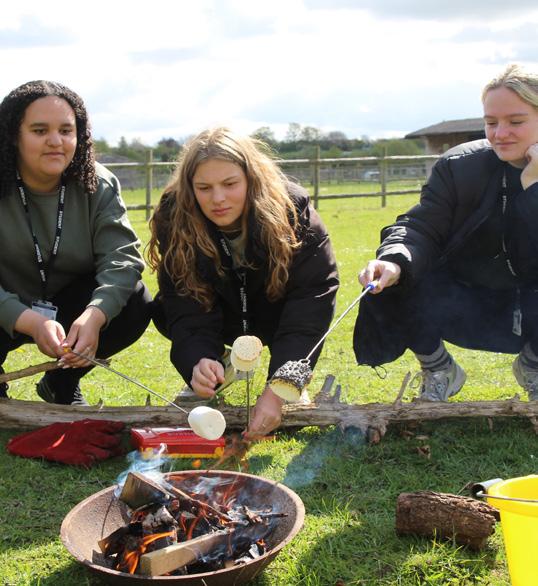
Staff from Nonsuch Park Forest School visited Nescot to demonstrate to Early Years students the kinds of activities they offer day-to-day. The Nursery’s philosophy is to equip young children with an education that encourages an appreciation of the natural world. The handson demonstations included whittling, fire lighting, bow sawing and leaf prints and concluded with toasted marshmallows on the open fire. The demo gave students an insight into alternative career routes to consider upon completing their course.





Electricians are among the most in-demand construction professionals. Hi-tech tasks include transporting data along fibre-optic cables and programming computercontrolled ‘intelligent’ buildings and factories. Nescot will ensure you are fully-prepared to work to the high standards required in this industry.

“We learn in a really practical way, and I prefer it”


Electrical Installation is one of the best-paid trades within the construction sector, and around 275,000 electricians are currently working in domestic and commercial roles in the UK. It is also an area with a significant skills gap, with around half the regions of England having a serious shortage of qualified electricians.
Getting skills in electrical installation and engineering will therefore provide a basis for a rewarding career. You will be able to work and specialise further in a range of industries, including the high-priority sustainability sector.


“I’m really glad I chose Electrical. The course was hard at first, but the teachers are really good and you make so much progress. The workshops are great, and it feels like a good bridge between school and the industry.”
Electrical Diploma
Entry Requirements: GCSE English and Maths at a minimum of Grade 3.
Electrical Installation Diploma
Entry Requirements: 2 GCSEs at grade 4 or above in Maths and English.
Electrotechnical Technology (Buildings & Structures)
Entry Requirements:
Level 2 Diploma in Electrical Installation, plus GCSE Maths and English at grade 4 or above.
Health and safety
Communication and teamworking
Construction terminology
Organisational skills and planning
Numeracy and literacy
Sustainability
Professionalism and self-development
Problem solving


Level 3 Electrical Installation
See page 109 for more information



Appliance servicing
Commercial
installations
Control systems
engineer
Data engineer
Domestic electrical installations
Electrician or electrical fitter
Energy efficiency
Lift engineer

Lighting technician
Maintenance
electrician
(aircraft/motor vehicle)
Security systems
Solar energy
Start your own business
Work for a small or large construction business

“I chose to study Electrical because it’s varied and interesting, and it’s a buoyant trade – electricians will always be in demand. The lessons are interesting and the teachers are really good. There’s some Maths and quite a lot of science, but it’s always directly relevant to what you’re learning. Next year I’m hoping to get an apprenticeship, so that I can keep learning at college while I’m doing a job.”



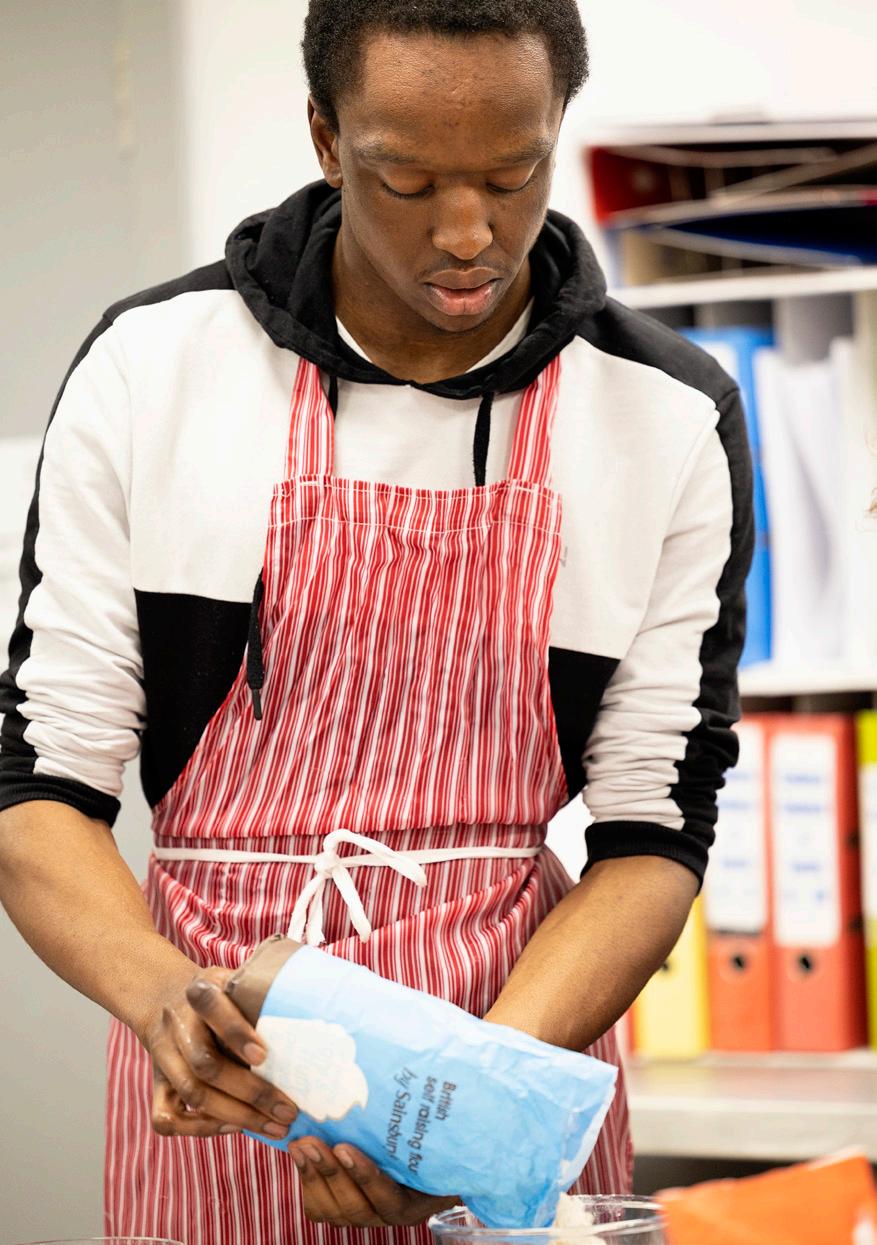

Nescot’s Foundation Learning department offers a wide range of qualifications aimed at supporting students to achieve their full potential. Some of our programmes are aimed at students with learning difficulties and disabilities, and others have been developed for young people who left school with few or no formal qualifications.

“Everyone in Foundation Learning is really supportive and helpful”


Courses for students who have mild to moderate learning difficulties and/or disabilities.
Excellent transition arrangements with many local schools, which helps to reduce any anxiety caused by moving and starting college.
Work experience and employers visits with our local employers including Mayfield Lavender Farm, St Mary’s Church, All Things Nice, Rainbow Leisure Center, Epsom Library, Epsom and Ewell Job Center and many more.
Every programme leads to an externally-accredited qualification - real evidence of your success that you can take to any employer or college in the country.
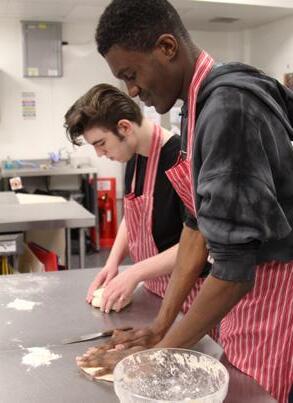

One of our supported interns, Josiah, who had his work placement with Aramark said, “It’s been really good experience working in the Refectory. I have enjoyed assisting and helping out with the various tasks in the kitchen.”
Students on all pathways will study English and Maths at an appropriate level until they reach Level 2 or GCSE Grade 4-9.
This qualification is aimed at students who are transitioning into college from a specialist learning environment and require higher levels of support.
This pathway is for students who need support to develop life skills to help them become more independent.
The intent of this pathway is to give students the competencies they need for employment. Students on this pathway are preparing for the world of work and progression towards the Supported Internship Programme or employment.
Entry Level 2
The intent of this course is to develop students’ confidence and employment mindset via a range of work based activities.
Entry Level 3
Vocational Pathways
To take advantage of employment opportunities in the local area and to prepare students for the Supported Internship, we offer Entry Level 3 Curriculum in three vocational areas:
Introduction to Service Industries
Introduction to Computing Construction and Groundworks


This pathway has been designed for students who are planning to go on to Further Education.

This is a one year study programme aimed at young people from our employment pathways or external providers and have an EHCP and need support to move into paid employment.

The 14-16 offer is for young people with EHCPs who are currently home schooled or who are struggling with the traditional GCSE Curriculum in a mainstream setting.

In this pathway we offer a bespoke curriculum and a Personalised Learning Plans for students who struggle with high anxiety. The aim is to progress the young person to the 14-16 Progression Pathway or fulltime courses the following academic year.
Animal care
Catering
Grounds
Highways
maintenance
Horticulture
Hospitality
Created in collaboration with Ringway, Surrey’s leading highway maintenance contractor, this one-year entry level course is designed to provide a pathway to the Ringway Highways Maintenance/Groundworks Apprenticeship, Certificated by the Gateway examining body, the Building and Construction specification is delivered with input from Ringway and Eurovia staff with live briefs/industry projects, masterclasses and enrichment activities.
Office work
Retail
Some students may move on to supported employment initiatives or supported living.
Maggie who also completed her internship with Aramark and is now an employee added, “The Supported Internship Programme has helped me achieve what I wanted, a paid job. My tutors have been so helpful, kind and amazing. I enjoy what I do and everyone is so friendly and supportive.”
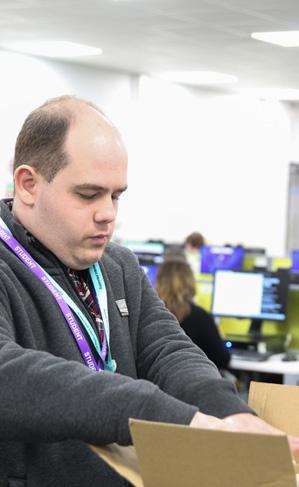



If make-up is your passion, then we have the course for you! Nescot has qualifications dedicated to aspiring make-up artists. You will have the opportunity to learn all aspects of make-up and hair styling at both Level 2 and 3.
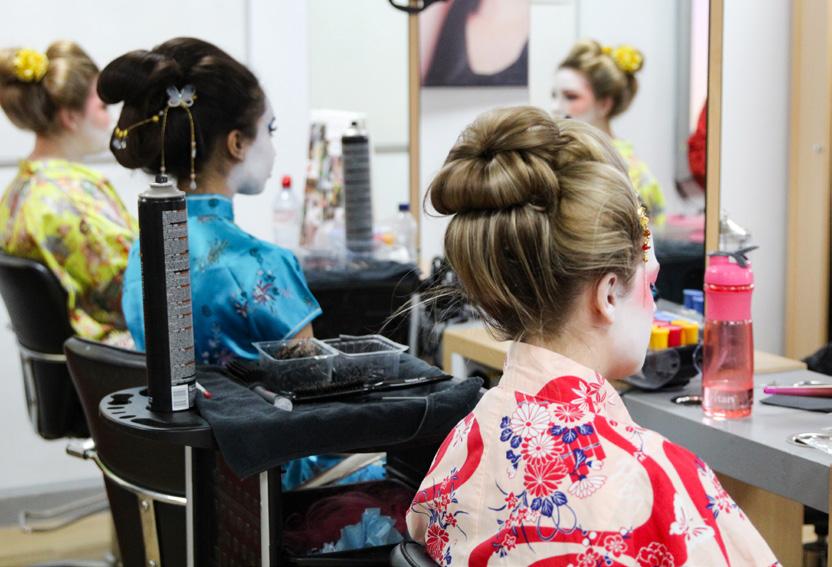
“The course is really practical, and our projects are really varied”


Opportunity to do work placements in local theatres as well as being supported in finding your own work in the make-up field.
Level 3 includes airbrushing, media effects, wig styling and much more. Perfect if you are looking for a career in TV and film.
Attend industry workshops with leading brands such as Kryolan and Banbury Postiche.
Develop your skills by doing the make-up for our own performing arts productions.


“We took part in a project where we created special effects makeup on casualties as part of a training exercise for student paramedics. It was hard work, but it was a great experience and I learnt a lot. We were encouraged to treat the creative brief as a job, and to research, plan and practice. We had to be really disciplined with our timing and that was good practice for the industry.”
Hair & Media Make-up
Technical Certificate
Entry Requirements: 3 GCSEs at grade 4 including English, plus a grade 3 or above.
Theatrical, Special Effects, Hair and Media Make-Up Diploma
Entry Requirements: Level 2 in Hair and Media
Make up (either the L2 Technical or Merits at VRQ or equivalent), plus a grade 4 in English.
Practical skills in a variety of hair techniques
Customer service / Client Care
Communication skills
Creative thinking
Digital skills
Industry acceptable time frames
Keeping to time
Portfolio development
Self-management
Numeracy
Health & safety

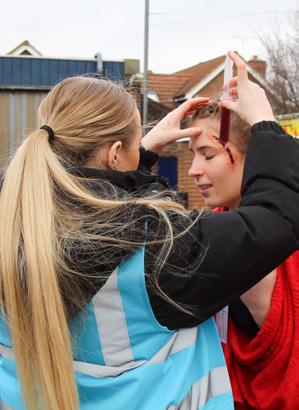



Our students have gone on to work in: theatre, fashion photography, advertising, bridal hair and makeup, salons and make-up stores / brands or self-employment.
Most go on to university or higher education to study: advanced fashion or advanced prosthetics HND courses, which will lead on to jobs for TV and Film.
Beauty writer Brand representative
Bridal make-up artist
Cosmetics retail
Image consultant
Make-up artistfilm, freelance, live music, photographic shoots, television or theatre
Make-up trainer
Mortuary make-up artist
Runway make-up artist
Special effects make-up artist
Teacher / trainer

“The best thing about the course is the variety – we do everything from stage makeup to using prosthetics to create special effects. It means I’m versatile as an artist, and it has also helped me to make an informed choice on what to do next. I’m going to university to study prosthetics and special effects, and I know that what I’ve learnt at Nescot has put me in a really good position.”


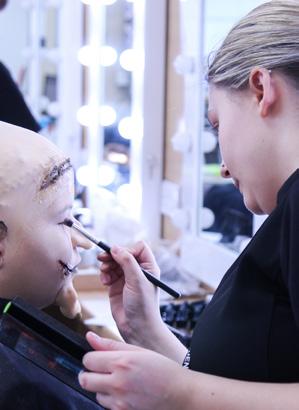




All hairdressing lecturers are experienced hairdressers and teachers and are trained by Toni&Guy in the London Academy. Our lessons are delivered to the same standards, preparing you for a successful career in the industry. Students are encouraged to push themselves and in 2024, two students from the Hair and Beauty department qualified for the WorldSkills UK Stage 2.

“I have been able to do work experience with Toni&Guy in London. It was an amazing experience”

Train with top hairdressing brands and products including L’Oreal and Label.m.
Vibrant lessons that are interactive and realistic reflections of the hairdressing industry.
The hairdressing department is powered by the multi awardwining hairdressing brand Toni&Guy, including visits from the team and seminars in the London Academy.


“Nescot was my local college of choice and the hairdressing course was exactly what I wanted and has given me useful experience for next steps. The best part has been meeting lots of new people. I plan to pursue hairdressing at university.”
VRQ Diploma in Hairdressing
Entry Requirements: 3 GCSEs at Grade 3.
VRQ Diploma in Hairdressing
Entry Requirements: 4 GCSEs at grade 3 or above including English at grade 3.
Practical skills in a variety of hair techniques
Developing passion and industry awareness
Organisation and communication
Customer service
Creative thinking
Numeracy
Health & Safety
Digital skills
VRQ Diploma in Hairdressing
Entry Requirements: Level 2 Diploma in Hairdressing with the majority of grades at Merit or above, plus English and Maths.

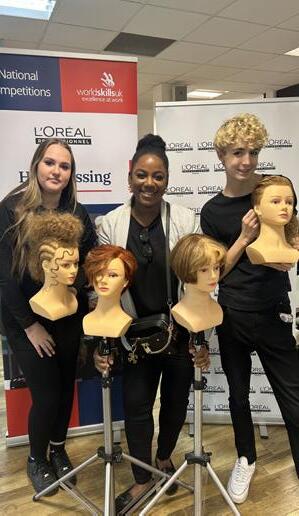
See page 106 for more information

All Nescot Hairdressing staff have been trained by Toni&Guy in their cutting and colouring techniques and we use this approach within our hairdressing teaching here at the College. Toni&Guy provide:
Two workshops/demonstrations on these techniques each year
Motivational and success recognition opportunities to reward highly successful Nescot students
Salon work experience and details of job opportunities.

Barber
Surrey Colleges Surrey’s Got Talent
Hairdressing competition held at Nescot featured amazing student talent and creativity at all levels. The competition which saw participation from the Surrey FE group colleges, was open to Hairdressing Levels 1, 2 and 3 groups.
Nescot students, Natalie King clinched the top spot and Zoe Dearnlaney secured second place for the Level 3 group in the category Avant-Garde with their design theme of Sustainability.
Colour technician
Cruise ships
Fashion
Hair and beauty sales
Brand trainer
Hairdresser
Image consultant
Receptionist
Salon stylist
Salon manager
Spa stylist
Television, film and theatre
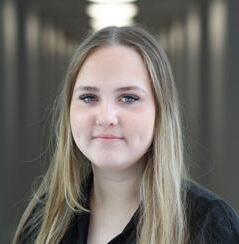
“I was recommended by my tutor to take part in the regional heat of WorldSkills UK and was thrilled to be one of the winners in my stage. Taking part in the competition was an amazing experience. The support and guidance I have received on the hairdressing course has been really helpful.”


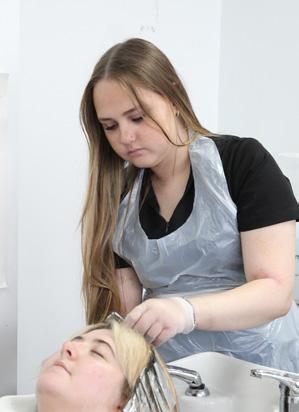




Whether it’s children, young people, older people or families, if you’re interested in working with people, the health and social care sector could be a good choice. It can be challenging, but hugely rewarding. We have excellent links for work placements with the public sector and private care providers.
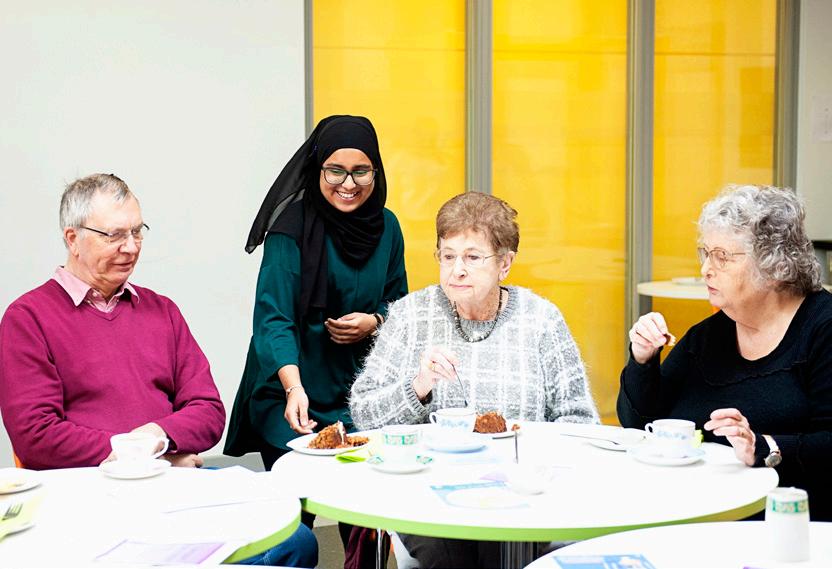
“We do a lot of work experience, which is a great way to find out which career would suit you”

Nescot’s Health and Social Care students are so wellregarded that employers send us their vacancies because they want someone ‘Nescot qualified’.
Tutors are excellent teachers and mentors, with industry experience ranging from social workers and nurses to health care managers and childcare professionals.
The quality of teaching in this department is consistently recognised as good or above.
Become the care professional you want to be. You will gain a thorough understanding of the theory in your chosen area
and we will provide you with innovative, exciting opportunities to put that understanding into practice. You will be given the opportunity to experience working in an organisation relevant to your area of study due to our excellent links with the public sector and private care. We understand that the subjects we teach attract students with a real desire to make a difference, and we are extremely active in the wider community.
Additional qualifications are offered to enhance employability.

“The course is really varied. We study lots of different topics, and we do theory lessons, practical lessons and work placements. I like the variety, and it means you have lots of options open to you. I’m doing my placement in a care home for people with dementia. I’ve also done placements in a nursery and in a primary school.”
Introduction to Health, Social Care and Children and Young People’s Settings
Entry Requirements:
A minimum of grade 2 in GCSE Maths and English.
Health & Social Care
Diploma
Entry Requirements:
4 GCSEs at Grade 3 or above, including English and Maths.
Practical & physical care-giving
Knowledge of nutrition and mental health
Intergenerational working
Legislation, health & safety
Organisation & communication skills
Safeguarding, equality & diversity
Self-confidence
Empathy
Literacy, numeracy & IT skills
Observation & assessment
Health & Social Care
Extended Diploma
Entry Requirements: Four GCSEs at grade 4 or above including English, Maths and preferably a Science.*

Health – T level
Entry Requirements:
5 GCSEs - grade 5 in English, grade 4 in Maths and three other subjects.
Progression at
Healthcare Play Specialist Apprenticeship
Foundation Degree in Healthcare Play Specialism
Coming Soon - Nursing Associate Apprenticeship
BSc in Bioscience




Our students have gone on to universities including:
King’s College London - Midwifery, Kingston University - Social Work, University of Roehampton - Early Years, University of Roehampton - Teaching, University of Surrey - Adult Nursing, Nescot (Higher Education)
Care assistant
Community worker
Health care practice worker
Home carer
Key worker
Nutritionist
Nursing
Nursing home practitioner
Occupational therapist
Pharmacy assistant
Probation officer
Public health
Rehabilitation officer
Residential warden
Social worker
Speech therapist
Teaching assistant
Youth worker

“I was really daunted about starting my placement, but it has been amazing. The first year I worked in a primary school, and this year I’ve been working in a men’s prison. I’m based in the visitor centre, and I check in with the families about how they’re doing. The placement has really helped me to mature, and it’s changed my perspective.”






If you have a passion for cars or engineering then our specialist training courses could provide you with an introduction to the industry, or build on existing skills developed in the industry and further your career opportunities.

“There’s a big change from school, especially with how we’re treated”


The UK automotive industry employs around 800,000 people. You will learn in our Motor Vehicle Centre on real vehicles to help you master the business side of the industry as well as your technical skills.
Gain practical experience and the technical knowledge needed to work as a Service Technician, carrying out maintenance/ repairs on cars, vans and other light vehicles in garages, dealerships and maintenance depots.
All courses are accredited by the Institute of the Motor Industry awarding body.
Hands on experience in the workshop, and at the racetrack. Learn on several vehicles in the college workshop including the racing car, and study systems such as the brakes, engine and suspension.
Nescot team, driver and race car entered into the Student Motorsport Challenge.

“It can be a steep learning curve, but the course is planned so that you’re always building on what you know. Level 2 has been more in-depth, including suspension and electrical systems. When we’re learning something new we usually do the theory first, and then a few practical sessions, and then we write it up. It’s a good way to learn, and it’s helped me to understand new skills really well.”
Vehicle Maintenance
C&G Diploma
Entry Requirements:
2 GCSEs at grade 3 in English and Maths.
Light Motor Vehicle Maintenance and Repair
C&G Diploma
Entry Requirements:
C&G Level 1 Diploma in Vehicle Maintenance.
IMI Diploma in Motorsport Vehicle Maintenance and Repair
Entry Requirements:
2 GCSEs - grade 4 in Maths and grade 3 in English. Applicants must have a strong interest in the Motorsport industry.
Accident repair
Body building
Fast-fit operations (tyres, exhausts, batteries etc)
Heavy vehicle maintenance and repair
Lift truck maintenance and repair
Light vehicle maintenance and repair
Motorcycle maintenance and repair
Motorsport maintenance and repair
Parts distribution and supply
Roadside assistance
Vehicle rental and leasing (self-drive or with driver)
Vehicle sales





Accident repair
Body building
Electric vehicle technician
Fast-fit operations (tyres, exhausts, batteries etc)
Heavy vehicle maintenance and repair
Lift truck maintenance and repair
Light vehicle maintenance and repair
Motorcycle maintenance and repair
Motorsport maintenance and repair
Parts distribution and supply
Roadside assistance
Vehicle sales

“The facilities at Nescot are really good. We have a big area to work in, and we have to keep everything really clean and tidy because that’s what will be expected at work. The tools we use in the department are the best brand in the industry, and we also have access to all the industry-standard diagnostic equipment, and even a range of different types of vehicles to work on.”






Join the Nescot Music Production department where creativity meets innovation in the world of music. Our Music courses are designed to equip you with the skills and knowledge needed to excel in this dynamic and ever-evolving field.

“There’s a lot of emphasis on working independently, because that’s a skill you’ll need in your career”


A focus on skills development across the different academic levels.
Utilise our state-of-the-art recording studios, podcast suite, DJ hub and Live room equipped with brand new instruments.
Learn from seasoned professionals and industry experts who are passionate about the music industry. They will guide you through the creative, technical and business aspects of the field.
Establishing and evolving links to industry, ensuring impact is felt at student level.
Creating a learning environment that is safe and inclusive, allowing creative students to be both reflective and ambitious.
Enriching the curriculum through unique educational experiences:
Real world projects with briefs designed by industry professionals.
International and domestic trips inform student projects.
Well informed guest speakers from a variety of specialists who celebrate the diverse nature of the creative industries
Collaborate with other creative courses to enhance your student experience.
Organise, set up and perform at various different events throughout the year.

“I’ve always loved music, so it’s amazing to be studying it full-time. The teachers have a lot of experience from working in the industry themselves, so they have a lot of knowledge to share. The best project so far was when a senior A&R executive from a record label came to college and asked us to record a 30-second track for one of his musicians to record. He gave us all individual feedback, and it was really cool.”
Music Production UAL Diploma
Entry Requirements: 3 GCSEs at Grade 2 or above.
Music Production UAL Diploma
Entry Requirements: 4 GCSEs at grade 3 or above.
Music Production UAL Extended Diploma
Entry Requirements: 4 GCSEs at grade 4 or above including English.
Technical know-how & ‘troubleshooting’
Music composition and performance
Time management and handling pressure
Collaboration
Freelancing
Networking and self-promotion
Communication





Progression at Nescot
Music Performance & Production UAL Diploma

Agent A & R
Our students have gone on to universities including: BIMM Institute, Bournemouth University - Music and Audio Technology, Southampton Solent University - Music Production; Popular Music Recording, Ravensbourne - Sound Design, Goldsmiths - Sound and Engineering, University of Hertfordshire - Music Journalism, University of Chester - Popular Music, University of LeedsMusic Production, ACM - Music Business; Music Production.
Composer
DJ
Entertainer
Lighting designer
Music manager/ director
Music teacher
Musician
Producer (live events)
Producer-engineer
Production manager
Publisher
Record label manager
Recording artist
Rigger
Singing coach
Songwriter
Sound engineer
Sound technician
Studio manager
Tour manager

“It was a steep learning curve at first, and the first project was really hard, but the teaching is brilliant. It’s amazing to go from having no technical knowledge to confidently using industrystandard software like Ableton and Logic. There’s a lot of emphasis on working independently, because that’s a skill you’ll need in your career, but the teachers are always there for you when you need them.”







Nescot College’s Performing Arts Department combines training in contemporary, physical, screen and musical theatre. It is made up of two companies: Forge Theatre and Nexus Ensemble. The companies perform with the ethos of creating work which is physically daring, emotionally engaging and visually stunning.

“As students we get excellent support from the teaching team”

Based on the principles of a drama school, Forge Theatre and Nexus Ensemble give you the opportunity to experience a professional theatre environment.
Specialist workshop opportunities throughout the year including stage combat, script writing, Heel’s workshops, and Commedia dell’arte.
All assignments are industry-focused, with an emphasis on performance.
Industry-related careers week with talks and workshops from casting agencies, drama schools, equity, performers and producers.
Enrich your education with theatre visits, both to watch performances and to have back-stage tours.
You will work in state-of-theart studios and workshops on the main campus.
Staff are experienced practitioners who still train and work within the industry.
Students practice as a company member and have the opportunity to perform in a number of different shows across the year in a variety of theatres. These have included Lyric Hammersmith, Soho Theatre and G Live in Guildford.

“I’m Deaf, and I use speech and British Sign Language to communicate. Nescot and the Performing Arts department are really inclusive and welcoming, and everyone has been so supportive. I would 100% recommend my course to other Deaf students –being here has played a role in helping me grow and gain confidence. I plan on continuing to study drama at university.”
Performing Arts Diploma
Entry Requirements:
4 GCSEs at grade 3 or above
Performing Arts
Extended Diploma (Acting for Theatre & Film or Musical Pathway)
Entry Requirements: 4 GCSEs at grade 4 or above.
Performance
Critical thinking
Problem solving
Creative idea generation
Communication and collaboration
Understanding your audience
Sales pitching
Portfolio building, industry awareness and agent links
Organisation, selfmotivation and selfemployment



Progression at Nescot
Professional Diploma in Performance




Actor
Our students have gone on to:
Royal Central School of Speech and Drama - Acting, Nescot - Professional Diploma, University of Chichester - Theatre Performance, Fourth Monkey, Guildford School of Acting, Mountview, Brunel University, University of Lincoln, Aelfa Academy of Dramatic Arts, University of East London, De Montford University, University of Surrey, East 15.
Arts administration
Box office and front of house in theatres
Choreographer
Communications
industry
Costume and
props technician
Cruise ship
performer
Dance performance
Event management
Film crew
Holiday camp entertainer
Journalist (arts)
Lighting technician
Marketing
Production
Script writer
Stagehand
Stage combat specialist
Theatre
Vocal performance

“I was really set on doing this course, after visiting Nescot at an Open Evening and seeing the facilities like the theatre and the students, I felt I could fit in immediately. I’ve learnt so much in my first year from my tutors. Being part of the industry, they specialise in what I want to learn and get me as a person. If you’re considering a Performing Arts course, make Nescot a serious contender.”






Get the practical and creative skills you need to do repairs and restoration work on houses and on large commercial developments like schools, hospitals and hotels.

“It’s physically hard at times, but we talk about how to work safely”


Career prospects are positive, with around 50,000 plasterers employed in the UK.
Excellent facilities with fully equipped dedicated plastering workshops that give students the opportunity to work on realistic projects.
Learn in large well-equipped workshops.


“I’m really enjoying the course, and I’d definitely recommend it. I’ve learnt a lot in the space of a year, and that says a lot about the teachers. The course is mostly practical, and you spend a lot of time improving your technique. So far I’ve done a window wall, ceilings and plasterboarding. As a female student I feel welcome and included.”
Plastering Diploma
Entry Requirements: 2 GCSEs at grade 3 or above, including English and Maths.
Plastering Diploma
Entry Requirements: Level 1 Diploma in Plastering.
Health and safety
Communication and teamworking
Construction terminology
Organisational skills and planning
Numeracy and literacy
Sustainability
Professionalism and self-development
Problem solving





Damp proofing technician
Decorative plastering
Dry liner
Estimator
Fibrous plastering
Rendering
Site manager
Start your own business
Work for a small or large construction business

“I knew I wanted to learn a construction trade, but I didn’t know which one would suit me best. Doing this course has given me the opportunity to try the trades for myself, and it also helps you understand how the trades fit together onsite. I’m staying at Nescot next year to specialise in Plastering.”
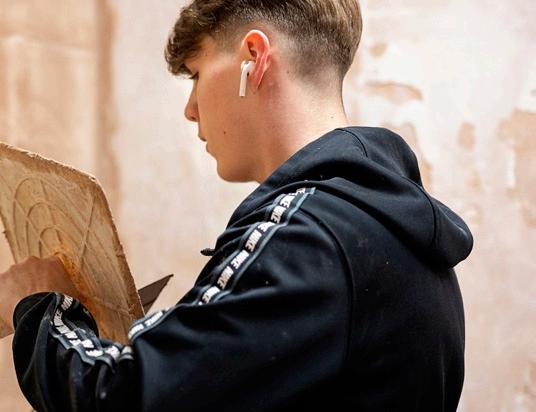

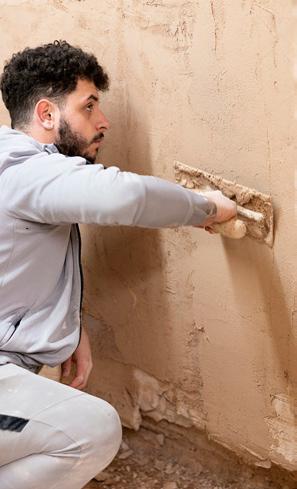

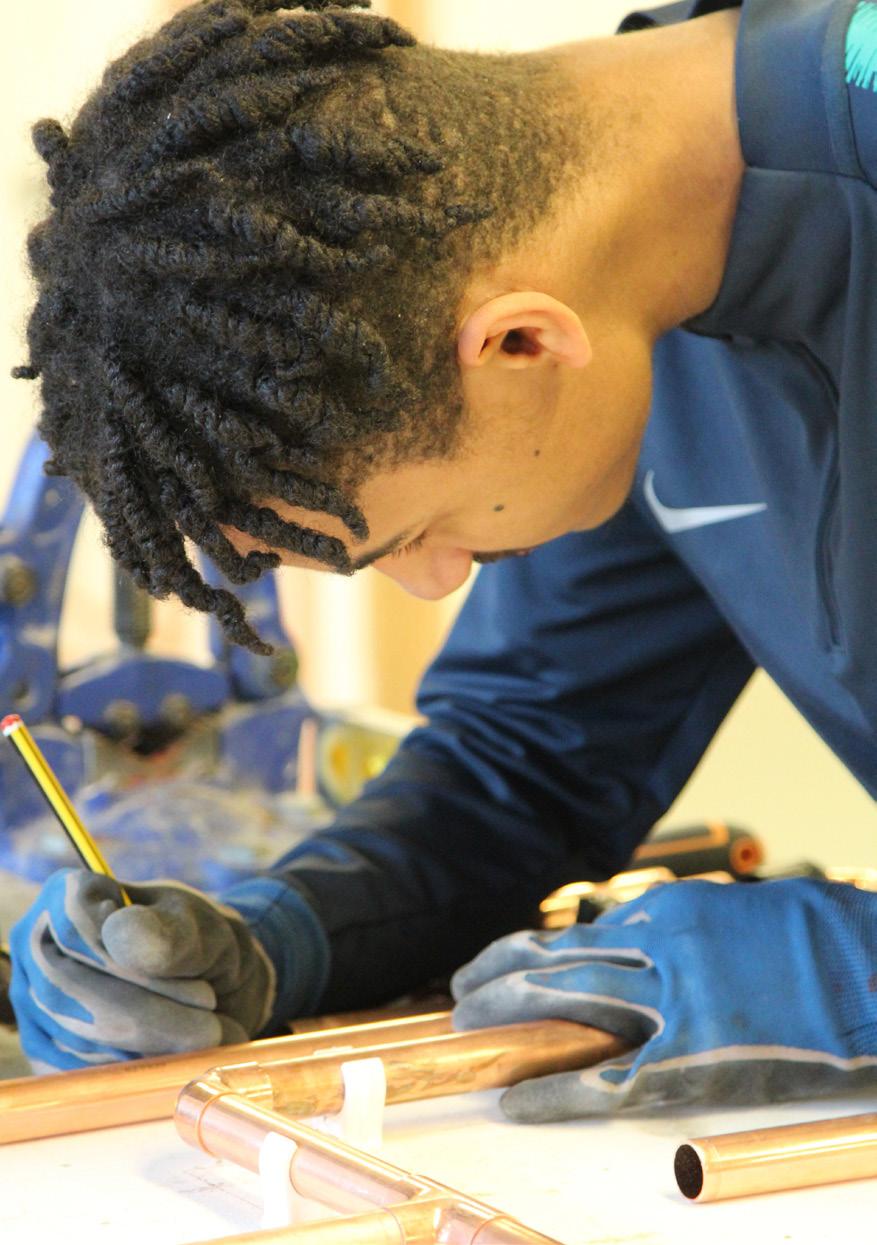

Precision counts in plumbing, so at Nescot we train you to work better than industry standard. Nescot plumbing students work to + or – 2mm. On site you’ll often find a 5mm variation, so you’ll have the edge from the start.
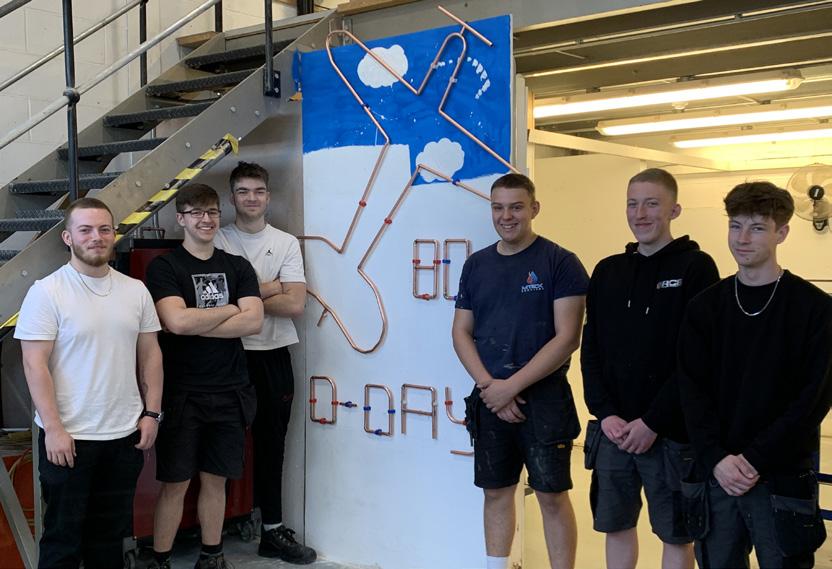
“The teachers here are all trained plumbers, so they can tell you about how things work on-site”


Plumbers work in all kinds of industries. You could find a job designing plumbing systems for new buildings, deciding how to manage, repair, and expand water systems, or developing new plumbing technologies. Where there’s water and people there’s a need for plumbing, so our courses are designed to give you
the skills and knowledge you need to help ensure you are never short of work.
160,000 people employed in plumbing and heating, ventilation and air conditioning with 2,000 new recruits every year (Construction Skills Network research).
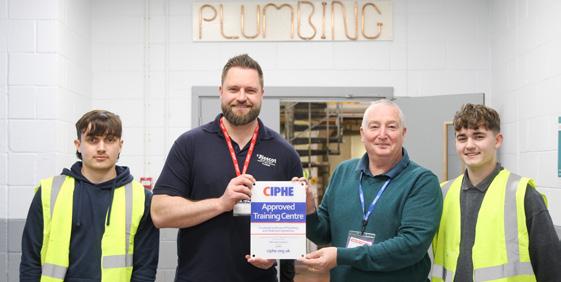

“I’m really enjoying being at college. The teachers are really good at explaining things, and because they’ve all worked in the industry they can give you lots of examples. I have ADHD and I can find it difficult to keep still, so I really like doing a practical subject.”
Plumbing Diploma
Entry Requirements:
GCSE English grade 2 and Maths at grade 3 or above.
Plumbing Diploma
Entry Requirements:
GCSE English and Maths at a minimum of Grade 4 in one, and Grade 3 in the other.
Level 3 Gas Engineer
Level 3 Plumbing and Domestic Heating Technician
See page 109 for more information
Health and safety
Communication and teamworking
Construction terminology
Organisational skills and planning
Numeracy and literacy
Sustainability
Professionalism and self-development
Problem solving

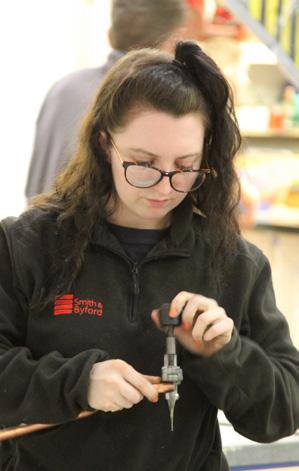



Bathroom and kitchen installations
Gas engineer
Heating and ventilation engineer
Pipe fitter
Pipe layer
Plumbing technician
Start your own business
Steamfitter
Work for a small or large construction business

“I’m really glad I chose Plumbing; I definitely made the right decision. We do lots of practical lessons, but the theory lessons are interesting too. I’ve just finished installing a basin and a toilet, and that was really good experience. I’m hoping to get an apprenticeship next year. I’m Deaf, and the teachers are really mindful of making sure I am able to access the lessons, and that I am included.”







Our staff have a combined experience of Crime, Criminal Justice, Law and the Legal system, working in the Fire and Rescue Service, as well as many years of experience teaching Public Services programmes. As a student you will be participating in group discussions and debates to increase your knowledge and understanding of the Government and expeditions, outdoor and adventurous activities that enhance your problemsolving, leadership, teamwork and cohesion skills.

“The course has given me so much direction and selfconfidence”

Practical sessions to improve your teamwork and leadership to bring learning to life.
Hone your problem solving, teamwork and navigational skills.
Expert training for the uniformed services entrance tests.
Practical team sports, leadership training and targeted fitness training to prepare you for a career in the uniformed public services.
Visits to parliamentary buildings, the Royal Courts of Justice and the Law Courts in Guildford, to demystify the workings of government, law and order. Develop skills in outdoor adventurous activities, as well as a thorough
grounding in cultural awareness and diversity to equip you to serve today’s multicultural society.
Learn from numerous guest speakers from the industry.
Opportunity to attend a ‘firefighter for a day’ course and ‘Look at Life day’, with the British Army.
Students meet guest speakers from uniformed public services, including a police dog handler and firefighters, discussing their careers and job roles.
Partake in different experience days across a variety of public services, such as leadership workshops in the British Armed Forces and Royal Navy.

“I chose Public Services because I love helping people. The course is really interesting, and I’d definitely recommend it. The teachers are really good at helping you to understand the lessons, and we do a lot of practical work. I’m hoping to be a firefighter in the future.”
Introductory Diploma in Public Services
Entry Requirements: 2 GCSEs at grade 2 or above, preferably including English and Maths or Functional Skills English Entry Level 3.
Preparation for Public Services Diploma
Entry Requirements: 4 GCSEs at grade 3 or above including English.
Uniformed Protective Services Foundation
Diploma Year 1 (Leading into Year 2 Extended Diploma)
Physical fitness and health
Assertiveness and resilience
Leadership
Integrity and professionalism
Cultural awareness
Digital skills
Legal frameworks
Literacy and numeracy


Entry Requirements: 4 GCSEs at grade 4 or above, including either English or Maths.





Our students have gone on to universities including:
Loughborough University, University of Law, Bournemouth University, Farnborough College of Technology, University of Exeter, Nescot, University of Portsmouth and University of Surrey.
British Army
Cybersecurity
Community leadership
Emergency services
Educational careers
Fire and Rescue Service
Fitness industry
Law
Officers Academy
Police force /
British Transport Police
Public transport
Prison services
Royal Air Force
Royal Navy Security
Territorial Army
UK Border Force
Uniformed services

“I chose the course because I’m hoping to become a police officer in the future. I’ve definitely learnt a lot on the course, and it’s put me into a good position with lots of knowledge to draw on as I apply to the police service.We do a lot of practical work to support what we’re learning. For example, we did a project where we planned the scenario of a road traffic collision, and we looked at the role of each emergency service.”






Our teaching team are sports industry professionals, having enjoyed successful careers in a variety of areas including sports coaching, personal training, strength and conditioning, sports therapy, osteopathy and sports centre management. That experience is used to bring learning to life!
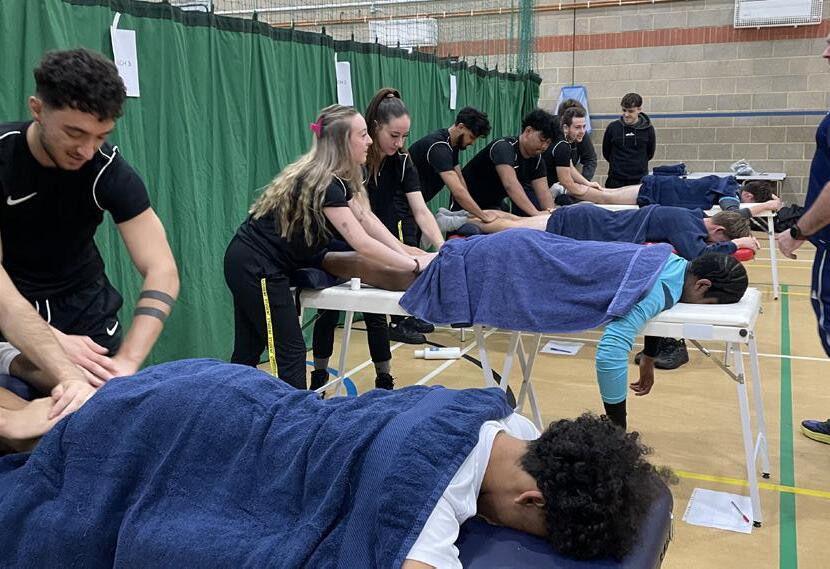
“I enjoyed learning about Sports Nutrition, and how you adjust a client’s diet”


You will be involved in sports coaching and fitness classes for all age groups and abilities in your community.
We actively encourage all our students to get involved in sport as athletes and coaches and we provide the support to ensure you fulfil your potential.
We make arrangements to work with your training and competition schedules. This means that you do not have to sacrifice your education for a promising sporting career.
Nescot Sports students have free access to the Sports Injury Clinic.
Our football academy coach, Jack Johnson, holds a UEFA A licence, which is the highest coaching badge. He is an Academy Coach at Fulham FC.
Some of our sport programmes include extra qualifications, such as Level 2 YMCA Fitness Instructing Certificate.
Many of our students have the opportunity to go on trips, completing outdoor adventurous activities as well as industry related visits.
Our students organise and run local primary schools’ sports day events.

“We do a lot of practical lessons, which is much more interesting and helps me to learn. The teachers are helpful and supportive, and I’d definitely recommend the course. I want to be a physiotherapist in the future, and I like that we’re learning from people with experience in the industry.”
Entry Requirements: 2 GCSEs at grade 2, preferably including English and Maths or functional skills Entry Level 3 in English.
Sport First Extended Certificate
Entry Requirements:
4 GCSEs at grade 3 or above including English.
Sport Foundation Diploma Year 1 (Leading into Year 2 Extended Diploma)
Anatomy and Physiology
Communication
Self-motivation and discipline
Designing exercise and fitness programmes
Fitness instructing
Psychology and mental well-being
Resilience and emotional intelligence
Literacy and numeracy

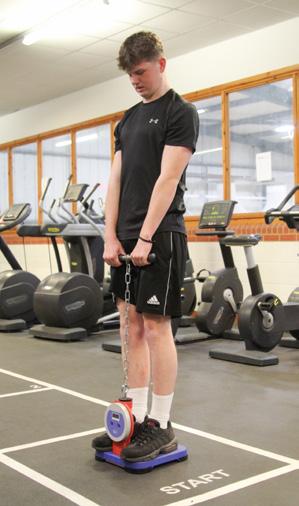
Entry Requirements: 5 GCSEs at grade 4 or above including English or Maths and PE.
Sport & Exercise Science Foundation Diploma Year 1 (Leading into Year 2 Extended Diploma)
Entry Requirements: 5 GCSEs at grade 4 or above including English and Maths and either PE or science.
Progression at Nescot



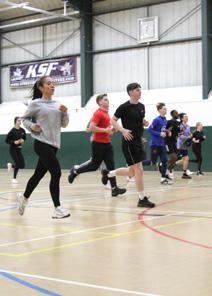
Our students have gone on to:
Nescot - Bachelor of Osteopathy, HND Sport & Exercise Science, University of Bath, St Mary’s University, University of Wales, University of Chichester, Kingston University, University of Exeter, University of Bristol and Bournemouth University
Athlete
Fitness instructor
Leisure attendant/
duty manager
Lifeguard
Nutritionist
Osteopath
Outdoor activities
instructor
Personal trainer
Sports coach
Sports player
Sports psychologist
Sports science
Analyst
Sports rehabilitaion
Sports therapist
Strength &
conditioning coach
Teacher
Youth worker

“I play football for Nescot, as well as a team outside college. The teachers tailor what we’re learning in class to make it relevant for the sports we do, and our career goals, and I appreciate that. We’ve been doing fitness testing, including the bleep test, and the teachers have been giving us tips on how to stride and how to control our breathing.”
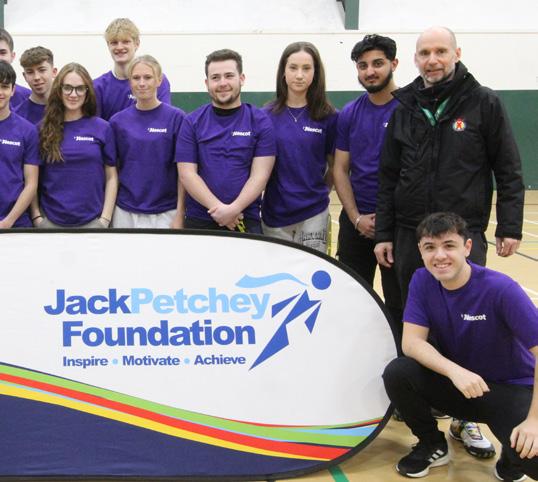

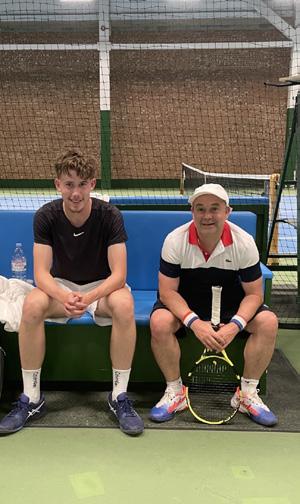



Teaching staff have industry experience with companies including British Airways, TUI, First Choice, Going Places, Virgin Atlantic. In addition staff have worked in destinations such as Egypt, Venezuela, Canary Islands, Thailand, Greek islands and United Arab Emirates.

“Studying at Nescot has prepared me for my career in the travel industry”


Teaching and assessment on our Resort Reps, Aviation and Cabin Crew courses have been awarded a grade 1 by the awarding body.
A newly-refurbished fullyequipped cabin service room, which is set up like an aircraft so you can carry out cabin crew role-plays such as delivering services, dealing with emergencies and customer service scenarios.
Industry-standard IT facilities and well-equipped classrooms.
Staff develop and nuture an interest in travel and discovery by organising and running overseas residentials and day trips.
Guest speakers who work in the industry. Past speakers have included representatives from Virgin Atlantic, easyJet, STA Travel and independent tour operators.
Work experience placements. In the last few years students have secured placements at The Ritz, easyJet, British Airways, The London Aquarium, and local placements with Chessington Garden Centre, Polesden Lacey, and Premier Inn with many offered permanent jobs.
Travel students can take additional qualifications in NCFE Resort Reps, Cabin Crew and Aviation Operations on the Ground, which employers value highly.

“Studying at Nescot has made me a lot more analytical. We learn about certain ideas in class, like the principles of good customer service, and then we apply those ideas to businesses across the travel and tourism sector. The facilities at Nescot are great, and learning in a proper cabin crew room makes it much more fun.”
Hospitality & Tourism
Introductory Diploma
Entry Requirements: Entry Level 3 in English.
Travel & Tourism
Extended Certificate
Entry Requirements:
4 GCSEs at grade 3 or above including English.
Customer service
Presentation and professionalism
Sales and marketing
Knowledge of Health and Safety
Business principles
Communication
Literacy and numeracy
Resilience and motivation
Travel & Tourism
Foundation Diploma Year 1 (Leading into Year 2
Extended Diploma)
Entry Requirements:
4 GCSEs at grade 4 or above, including either English or Maths.



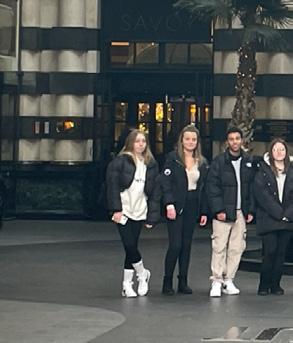

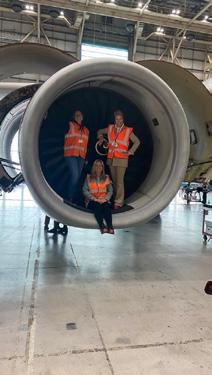
Our students have gone on to universities including: University of Surrey, University of Southampton, University of Chester, University of Brighton, Bournemouth University, University of Roehampton and University of Greenwich or directly into employment in: British Airways, Emirates Holidays, Newmarket Holidays, easyJet and Gatwick Airport
Accommodationconcierge, events planning executive, receptionist, reservations assistant
Cabin crew
Aviation - flight dispatcher, ground handling agent, passenger service agent, security officer
Cruise - entertainment host, shore excursion manager
Holiday company head office roles - contracting
and procurement, customer service, finance, human resources, marketing, retail travel agent Tour operations (Overseas)
- children’s representative, resort reservations
Visitor attractions
- host for events, entertainment, food, beverages, games or arcade, rides and attractions operator

Nescot’s Travel and Tourism students were proud to be part of the Betfred Derby Festival 2024 at Epsom Downs Racecourse. Our Level 2 and 3 students were part of the ‘Racemaker’ team using their skills developed within their course to assist visitors with directions and queries, helping to ensure an excellent experience was had by all.



Travel and Tourism student Frankie said, “We had such a great time working as part of the Racemaker Team. The guidance and the allocation of roles and locations was clear and organised. This opportunity has allowed me to develop my leadership skills. I was proud to be placed on the radio as a team leader during the second day.”


An apprenticeship is a real job where you learn, gain experience and get paid. You’re an employee with a contract of employment and holiday leave. By the end of an apprenticeship, you’ll have the right skills and knowledge needed for your chosen career.
It can take between one and 6 years to complete an apprenticeship depending on which one you choose, what level it is and your previous experience. It’s funded from contributions made by the government and your employer.



020 8394 8593 businesscentre@ nescot.ac.uk
We’ve been running apprenticeships for more than 70 years.
Fantastic teaching facilities including a fully-equipped construction centre.
We are located just over a mile away from Epsom town centre. Mainline stations Ewell East and Ewell West are within easy walking distance from the campus. We also have a large on-site free car park for students, and secure cycle storage.
We have many apprenticeships for you to choose from, ranging from Business and Computing to Early Years, Carpentry and Gas Engineering.
Our specialist staff have knowledge spanning many different industries.
We have excellent longstanding working relationships with local employers.
You will need an employer as well as an offer from the college. If you haven’t already done so you must apply for the apprenticeship on our website. An interview will be arranged with your Nescot assessor, who will review your qualifications and check that you meet the entry requirements for the apprenticeship you have chosen.

“Becoming a carpenter was a big career change for me, something I’d always dreamed of trying but didn’t really get the opportunity before. After chatting with the Nescot team I decided to go for it! I’m super supported by my employer (Ridgeback) and at Nescot. I love the work and enjoy getting involved in every aspect of the project, it’s been a wonderful experience.”
As an apprentice you need to be employed for at least 30 hours per week in a relevant job. To be eligible for government funding all full-time apprentices (those that work 30 hours per week or more) must spend, as a minimum, 6 hours per week, over the planned duration of the practical period, on offthe-job training.
We can support you to find a suitable employer, but here are some of the things you can do:
Be proactive and contact local businesses that you are interested in working for to enquire if they take on apprentices.
Check out our current apprenticeship vacancies on www.nescot.ac.uk/ apprenticeshipvacancies and apply to the role you are interested in.
Apply online and omplete your application and input the full details of the business/ employer so that we can progress your application.
To become an apprentice with us you must:
Be 16 or older
Be legally allowed to work in the UK
Have lived in the UK for the last three years

Send an email with the details of which apprenticeship you are interested in to businesscentre@nescot. ac.uk. The team will help you to reach local employers, and keep you informed of any vacancies.
Have a look at the national apprenticeship website www.gov.uk/applyapprenticeship to find and apply to apprenticeship vacancies in your area.

Entry requirements vary between courses. You will need to show that you are interested in and committed to the course you’ve chosen. Typically you will need a GCSE Grade 4 in both English and Maths.
As an apprentice you’re guaranteed to earn at least the National Minimum Wage for Apprentices (please refer to: www.gov.uk/employingan-apprentice/payandconditions-for-apprentices). There is no upper limit to what apprentices can be paid, and many are paid much more than the minimum wage.
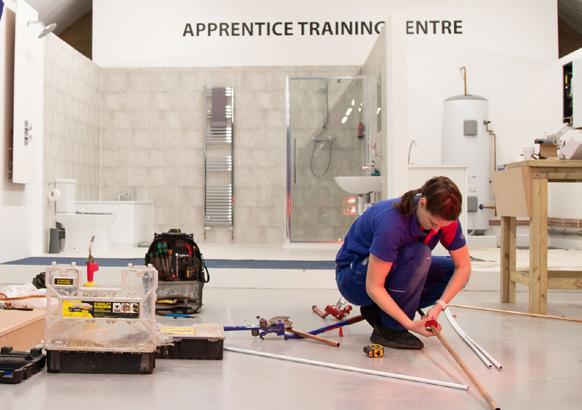
An apprentice would typically spend one day a week either in college or training in the workplace and the rest of the time would be spent working on the job. At college you’ll be taught in a variety of ways, including:
Practical and theory classes
One-to-one tutorials, guidance and support
Practical and written assessments, with feedback
Being observed at work by a qualified assessor.
Apprenticeship standards provide nationally recognised evidence of achievement. Depending on the level and type of apprenticeship, upon successful completion you could receive a license to practice in your regulated
profession or a professional certificate within your vocational area. Both provide evidence of the level of competence you have achieved within your profession.
Depending on the level, you could progress to the next level apprenticeship or to Higher Education. You could look for a full-time job at your company or elsewhere. Apprentices tell us their reallife work experience helps them stand out, and improves their confidence too.
LEVEL 2
Carpentry & Joinery
Customer Service
Practitioner
Hair Professional
Health Support Worker

We’ll get in touch to interview you, and if you need a job we’ll refer you to the Business Centre.
LEVEL 3
Business Administrator
Commercial Catering
Cyber Security Technician
Digital Support Technician
Early Years Educator
Information
Communications Technician
Installation Electrician and Maintenance Electrician
Gas Engineer Operative
Multi-Channel Marketer
Plumbing & Domestic
Heating Technician
Software Development Technician
Team Leader/Supervisor
LEVEL 4
Cyber Security Technologist
Software Developer
LEVEL 5
Associate Nursing (coming soon)
Health Play Specialist
Operations/Department

Manager Laboratory Scientist
A higher education (HE) course at Nescot can provide you with advanced skills to go further in your career. We’ve been providing a range of HE courses for 70 years and work with a number of universities, awarding bodies and professional organisations to deliver HNC/HND, Foundation Degree, Honours Degree and other advanced qualifications.


Each year, many students join us for the first time to study an HE course, and many more progress from one of our Level 3 courses in the college. Our annual Graduation Ceremony, held in recent years at the prestigious Epsom Downs racecourse, is the culmination of your achievement and an opportunity to celebrate with friends and family.

We offer university level courses in:
Accounting
Animal Management
Bioscience
Business & Management
Computing & IT
Counselling
Creative Media
Early Years
Environmental Health
Healthcare Play
Laboratory Scientist
Osteopathy
Performing Arts
Sport & Exercise Science
Teacher Education
READ OUR FULL NEWS STORIES HERE

INSTITUTE OF TECHNOLOGY OPENS ITS DOORS



NESCOT CELEBRATES 70TH ANNIVERSARY

PARTNERSHIP WITH RINGWAY FOR TRAINING PROGRAMME
CREATIVE MEDIA WIN GOLD AT WORLDSKILLS

CREATIVE MEDIA TEACHERS WIN FE TEAM OF THE YEAR


DYNAMIC AWARDS 2024 ‘EMPLOYER OF THE YEAR’ AND ‘COMMUNITY HERO’
MINISTER FOR SKILLS JACQUI SMITH VISITS NESCOT
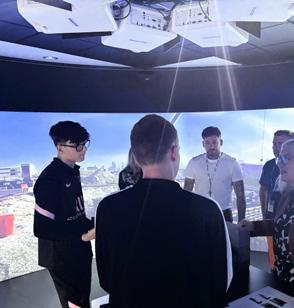
NEW! VR IMMERSIVE LEARNING SPACES
Applications can be made online via our course pages. Simply click on the Apply Now button of your chosen course.
Find out more about our courses on our website. Come to an Open Event (see our back cover) and chat to staff and current students.
Search for your course on our website and click ‘apply online’. You will need to have an email address to use the applicant portal. Once we’ve received your application we’ll send you a confirmation email.
We’ll check your application to make sure the course is right for you, and arrange an appointment to meet the tutor.
We’ll consider your application carefully and hope to be able to offer you a place. Your offer will be conditional on your GCSE grades. We might offer you an alternative and/or contact you to discuss your options.
You will need to accept your offer through your applicant portal. You can only accept one offer, so if you’ve applied for more than one course you will need to decline these offers. You will need to do this within three weeks, or we cannot guarantee your place.
We will invite you to a Welcome and Induction Event, usually in late June. We will be in touch with you to confirm the date.
The event will give you an opportunity to get a head start with your new course and to meet our other students.
We will contact you to invite you to enrol from late August. Enrolling will confirm your place at Nescot. If your grades from GCSE or other exams aren’t what you hope for, we will offer you a place at an alternative level (subject to availability) or help you find a different course.
Term starts in early September. From your first day at the college we will support you to succeed and fulfil your ambitions in education.

You can get help with choosing your course at any time – Contact our Admissions team:

The college is in north-east Surrey, in Transport for London’s Zone 6 and served by Southern and South Western Railway. We’re a five-minute walk from Ewell East Station, and we have free secure bicycle storage and a large free car park.
Trains
Ewell West Rail Station
To Waterloo via Raynes Park and Clapham Junction
Ewell East Rail Station
To Victoria and London Bridge via Sutton and Croydon

Disclaimer
This prospectus describes our courses, services and facilities. It was compiled in September 2024 and relates to the programmes we intend to offer for the year starting in September 2025. Every care has been taken to ensure that the information contained is accurate at the time of printing, but the course programme is subject to continuing development and changing circumstances that may necessitate the cancellation of courses or alterations to the course content, or other related matters. Some courses described are still subject to external validation before they can be run. The college reserves the right to make any such changes with as much notice as possible. These rights shall be incorporated in any contract between the college and a student, safeguarding the college from any liability whatsoever in respect of any such changes. Some courses attract additional costs, including materials and protective clothing.

WEDNESDAY 4.30PM TO 7.30PM

www.nescot.ac.uk
TUESDAY 4.30PM TO 7.30PM
THURSDAY 4.30PM TO 7.30PM


